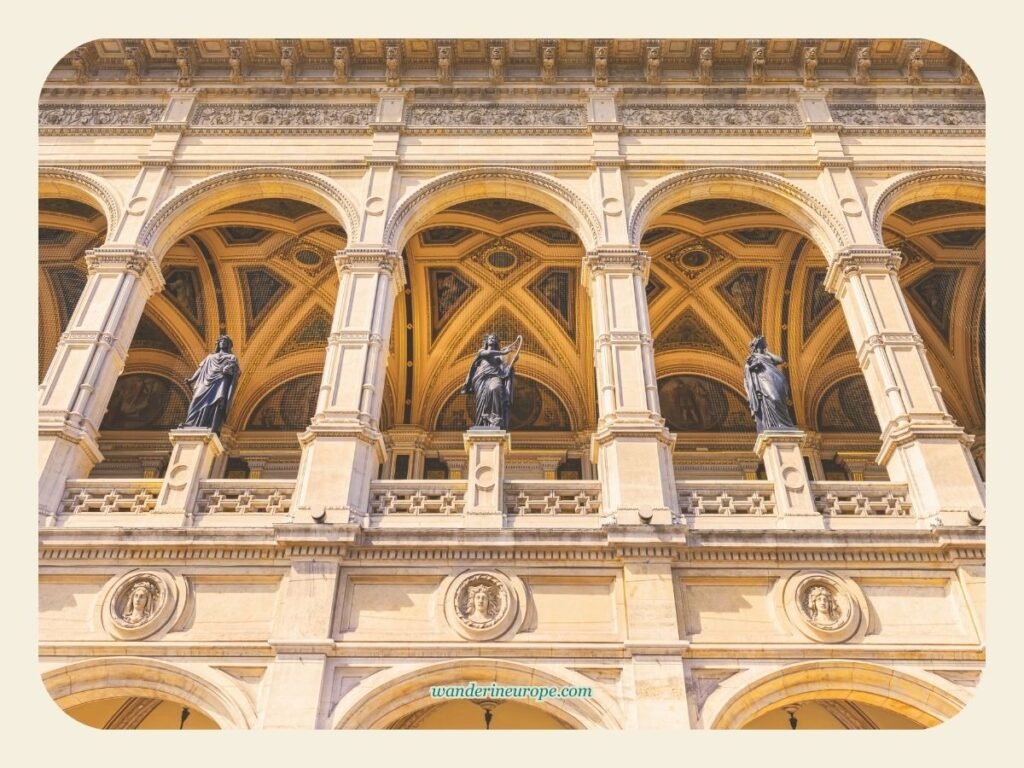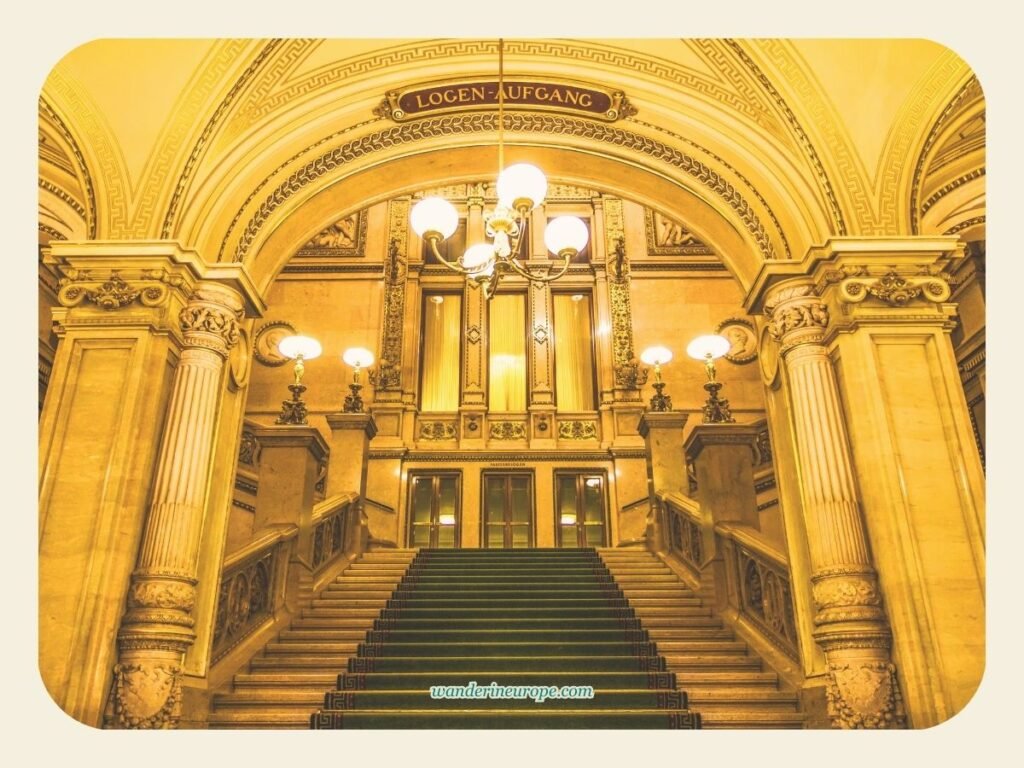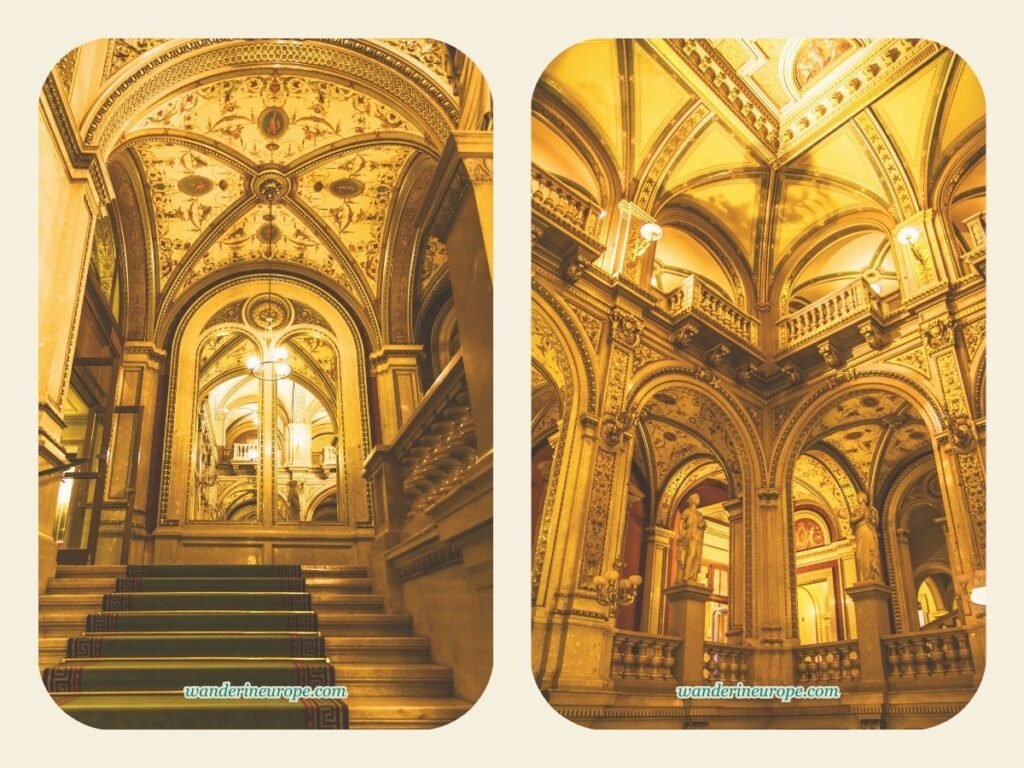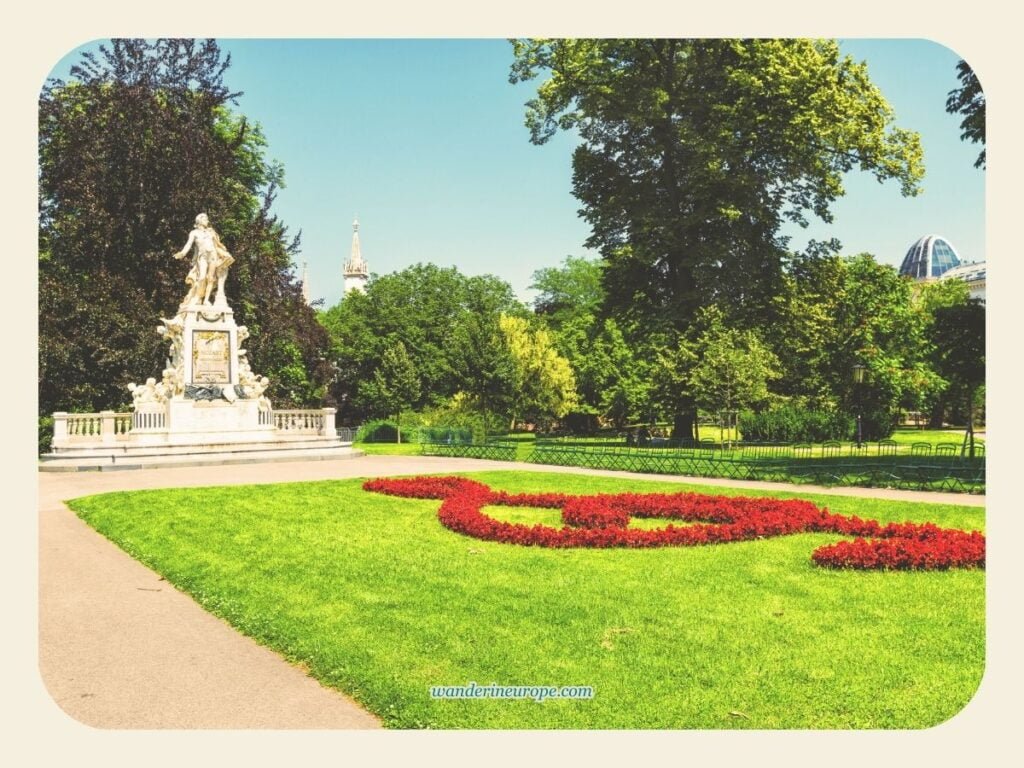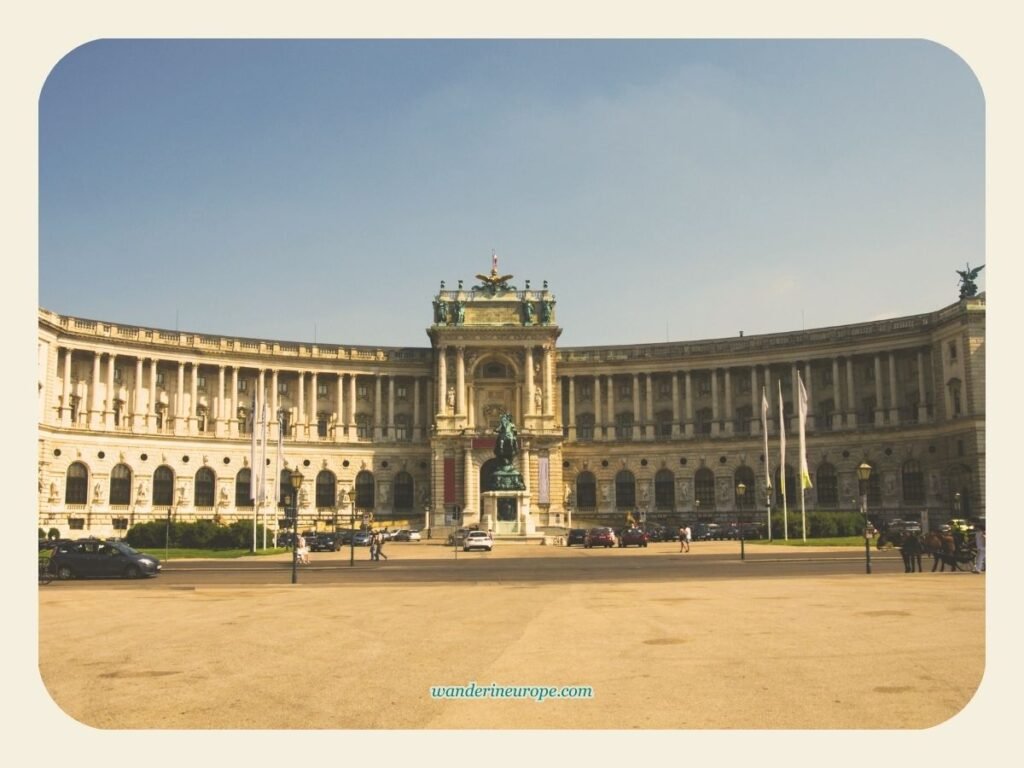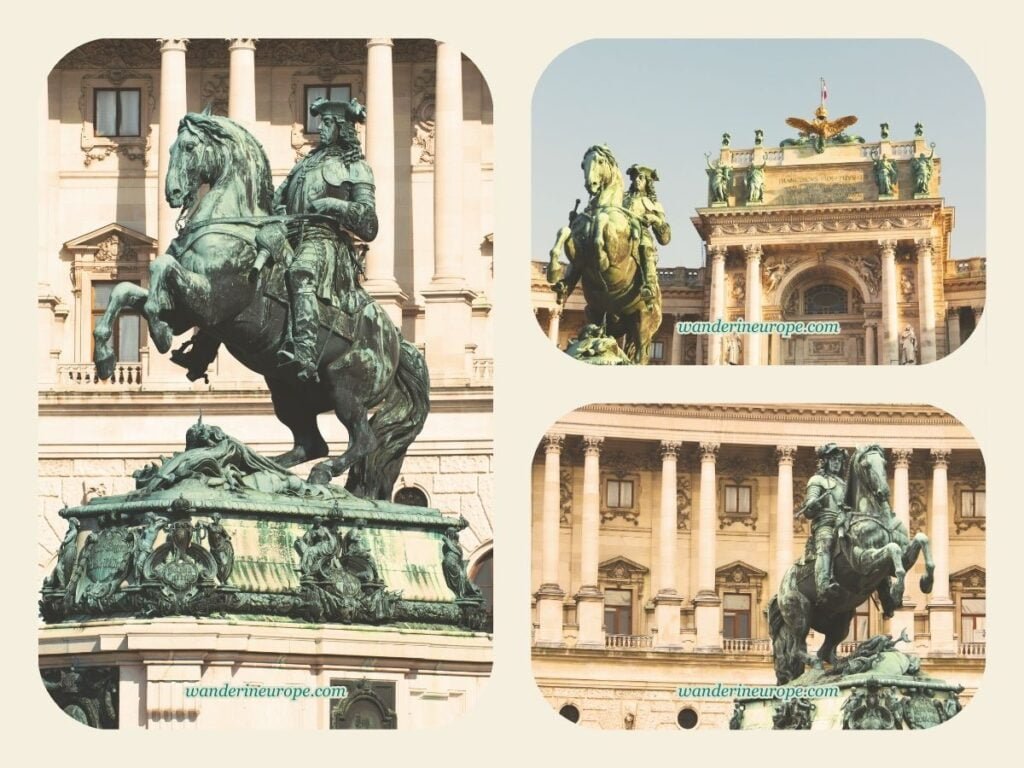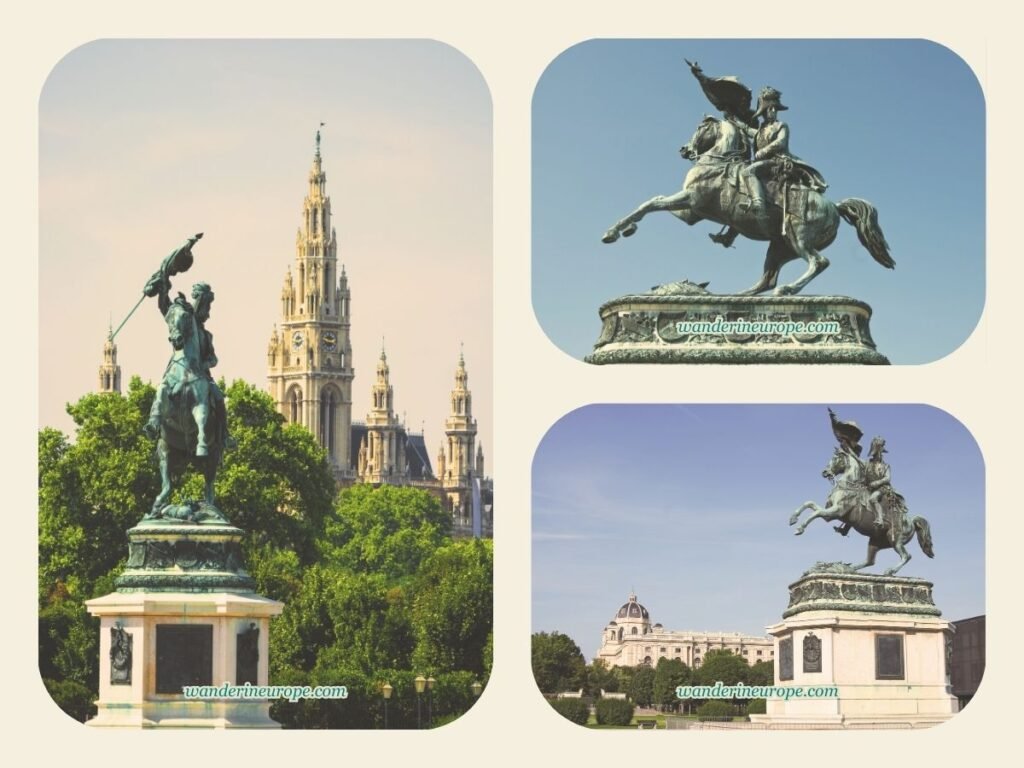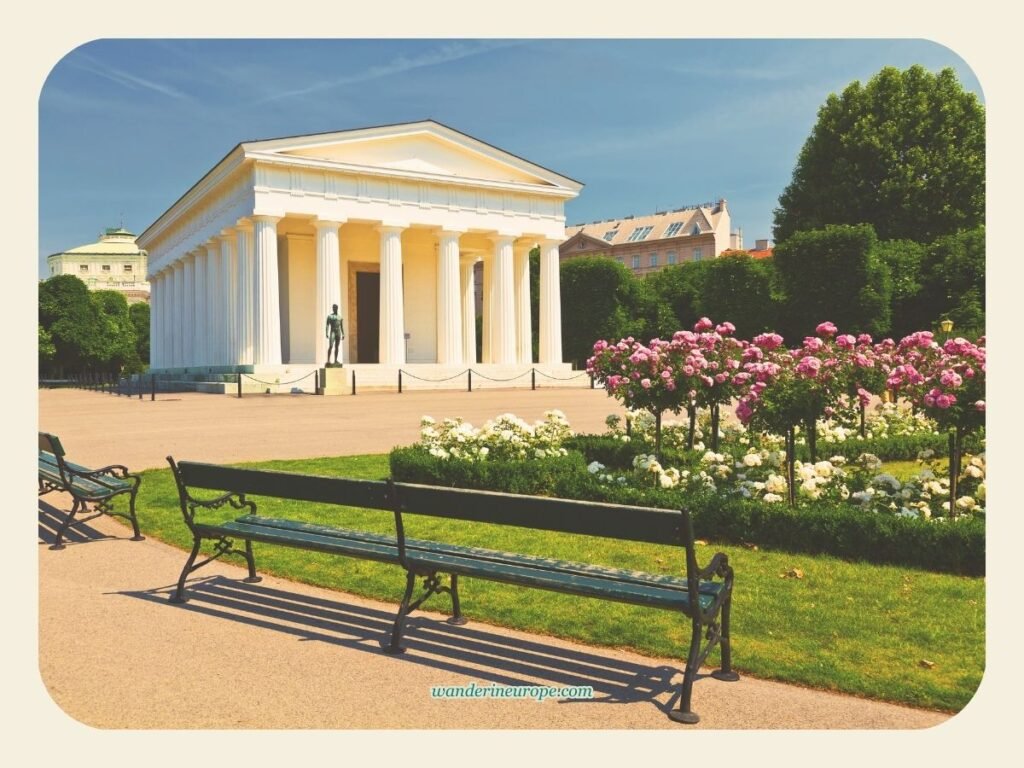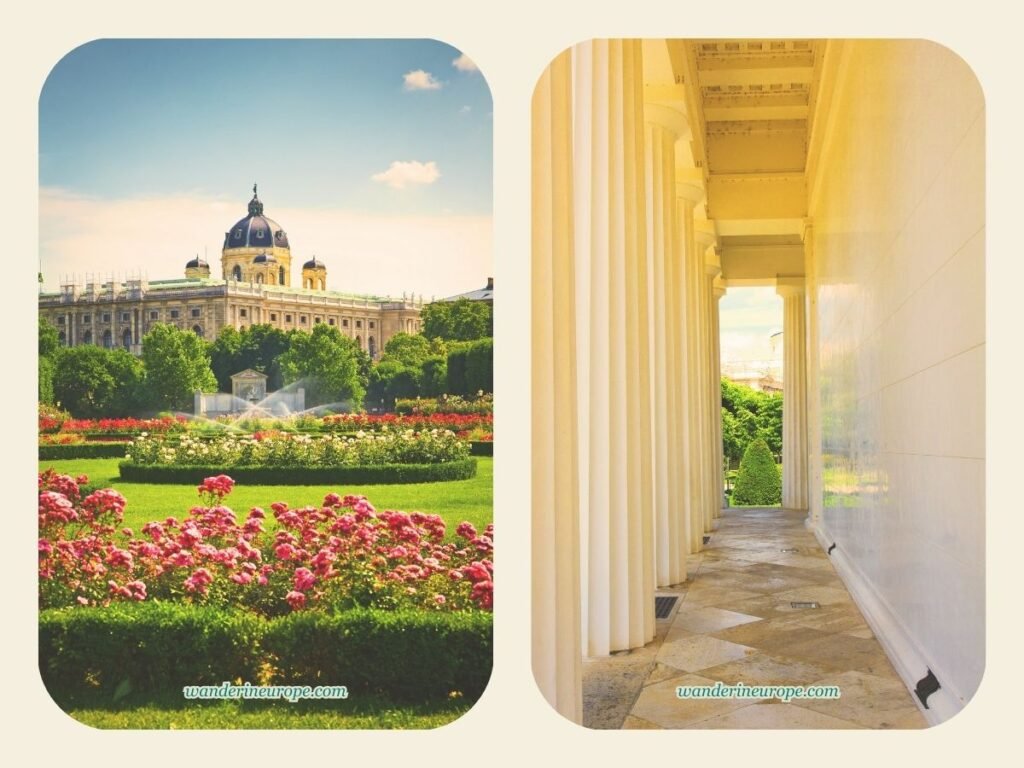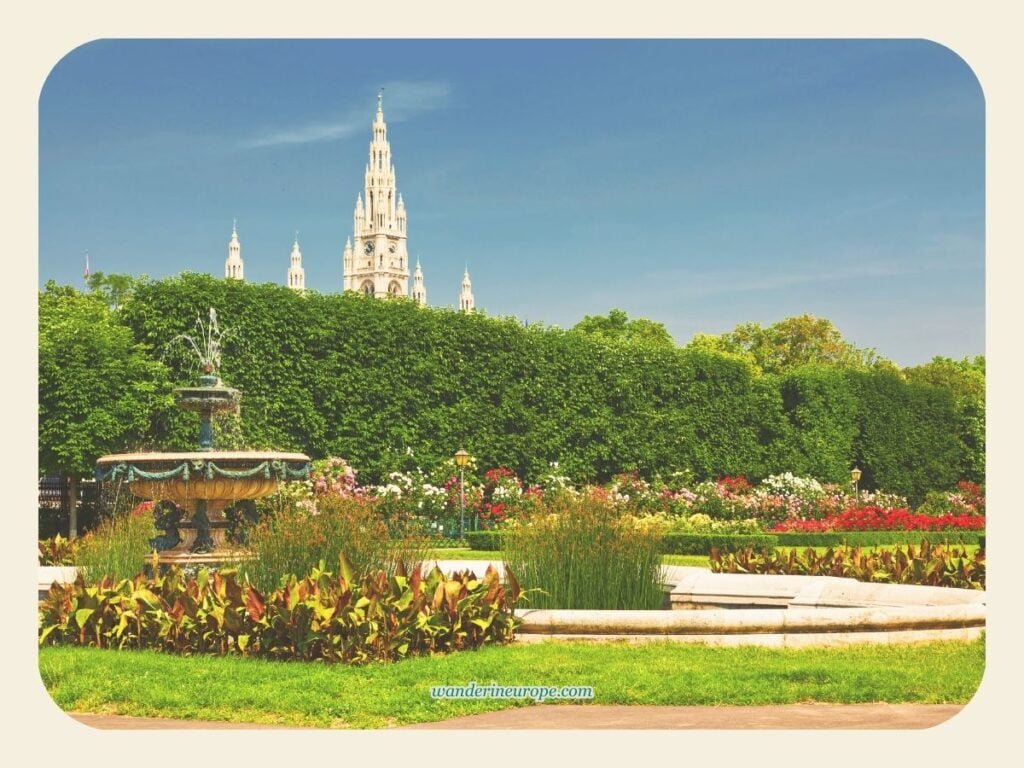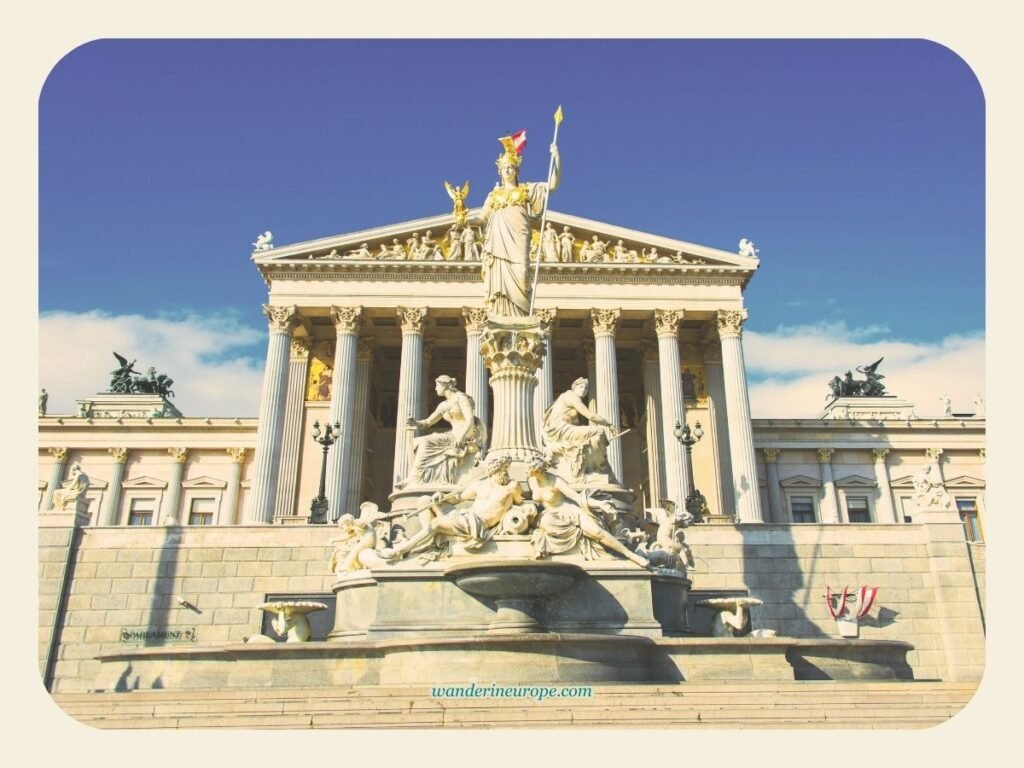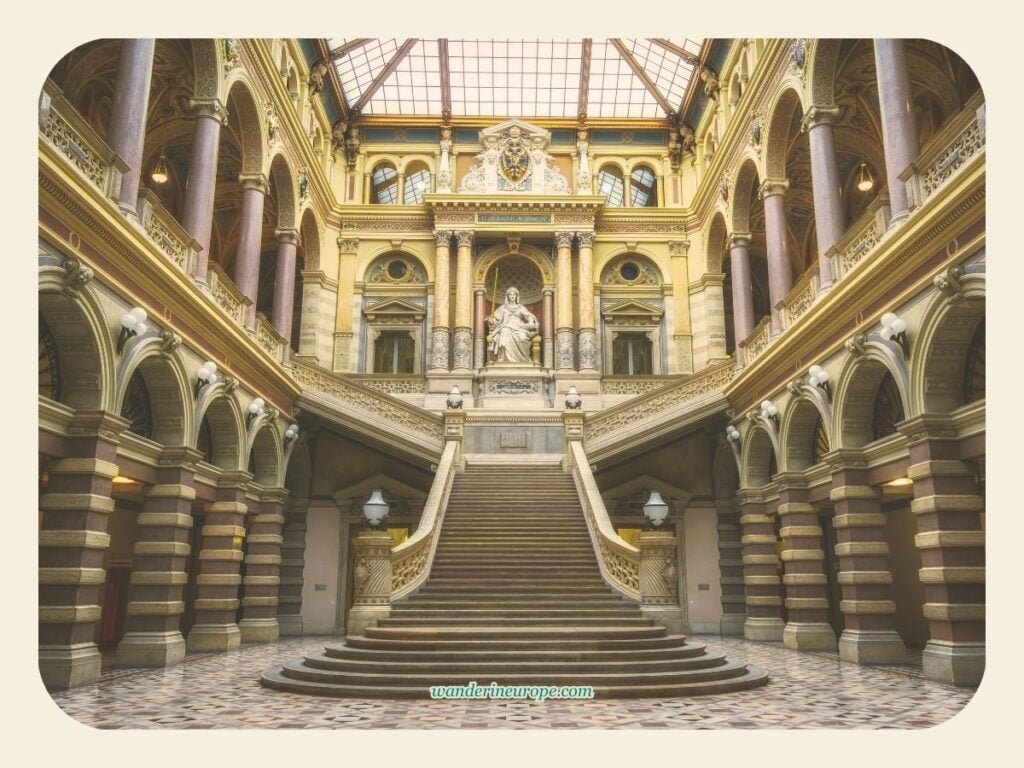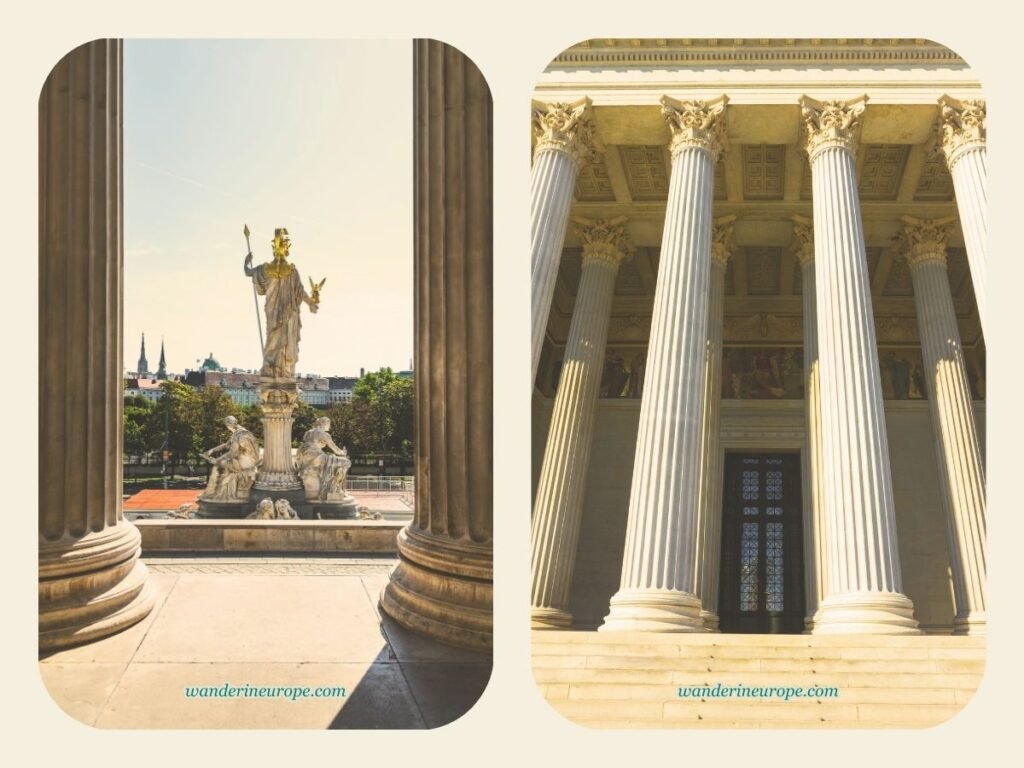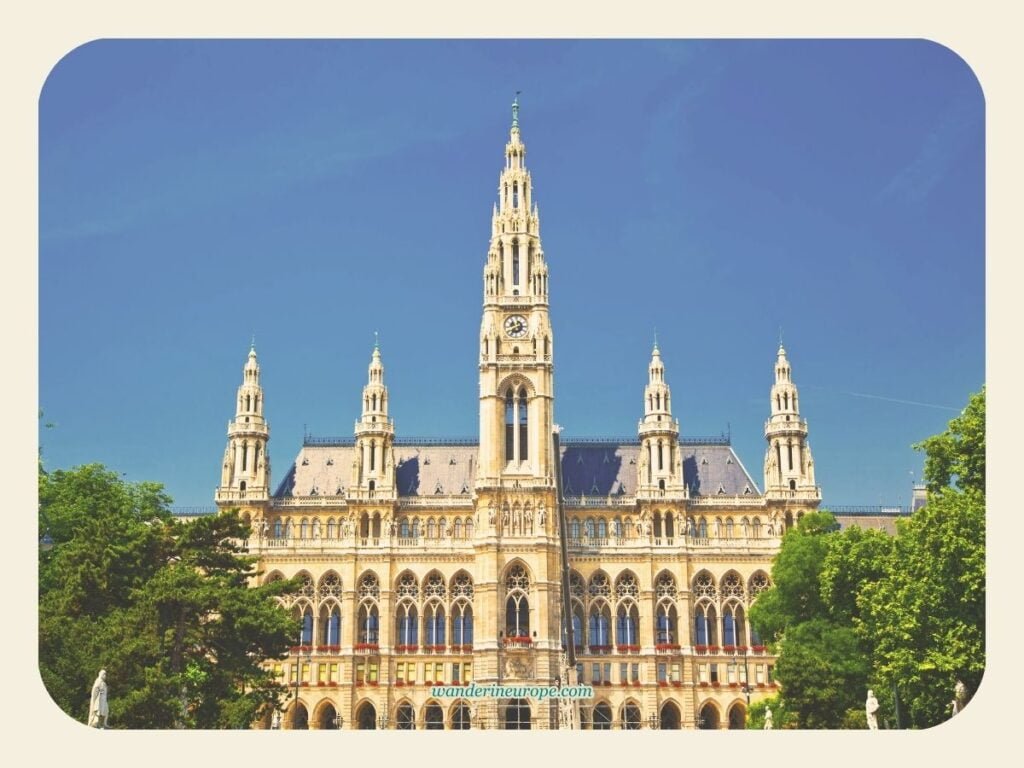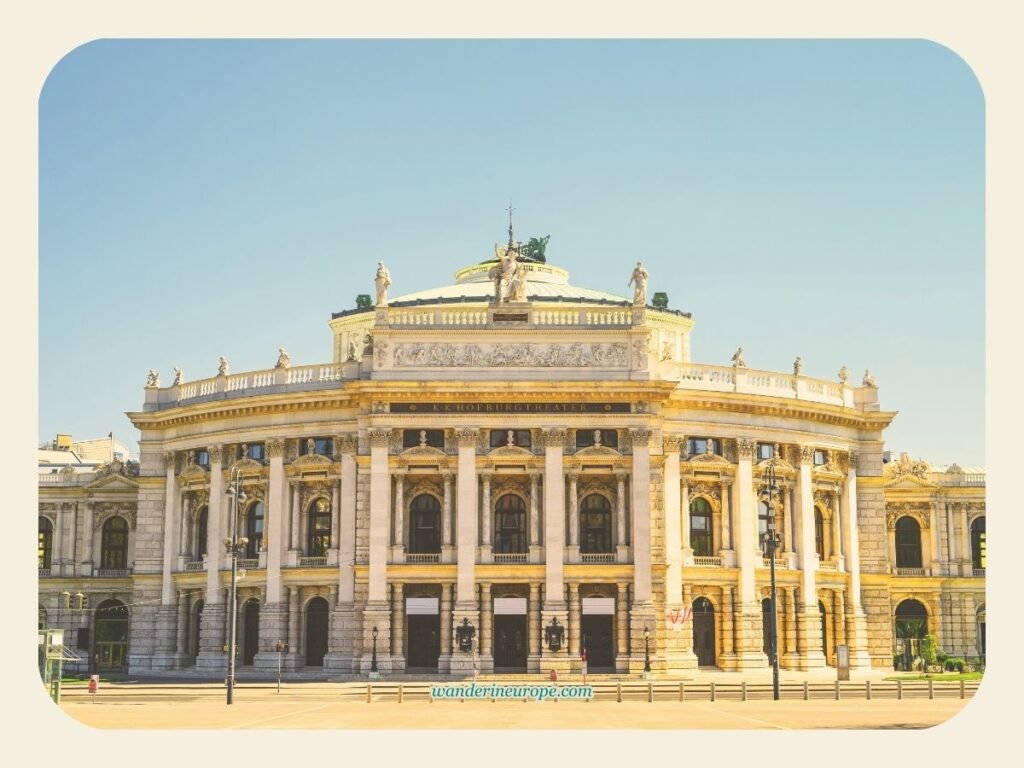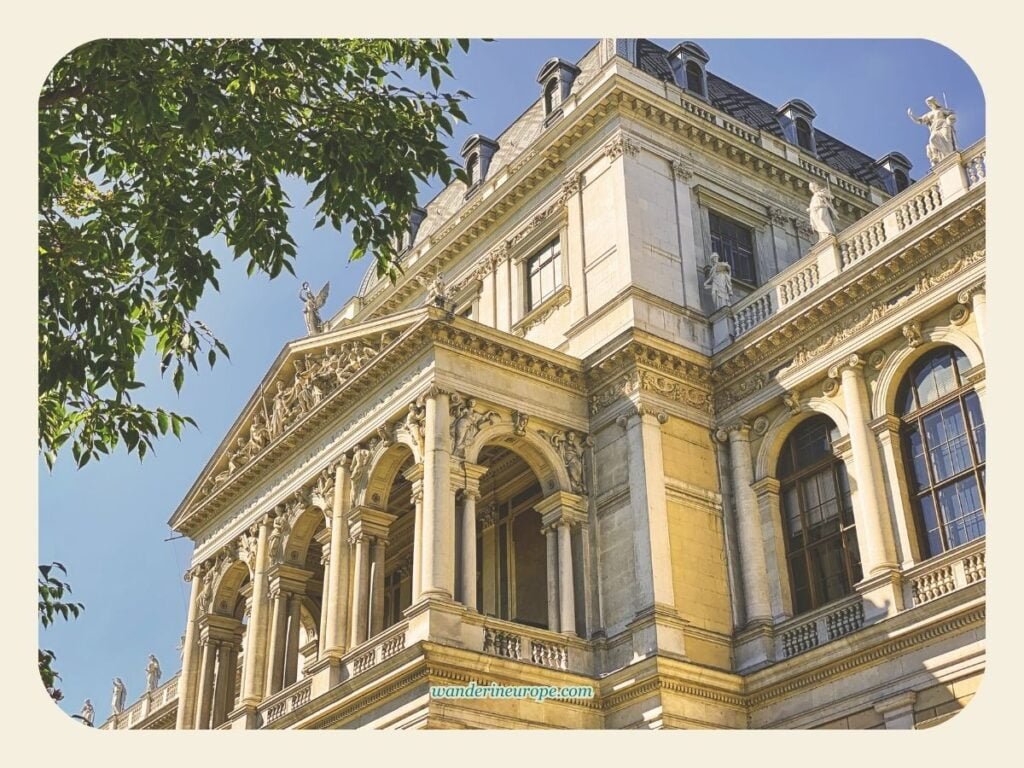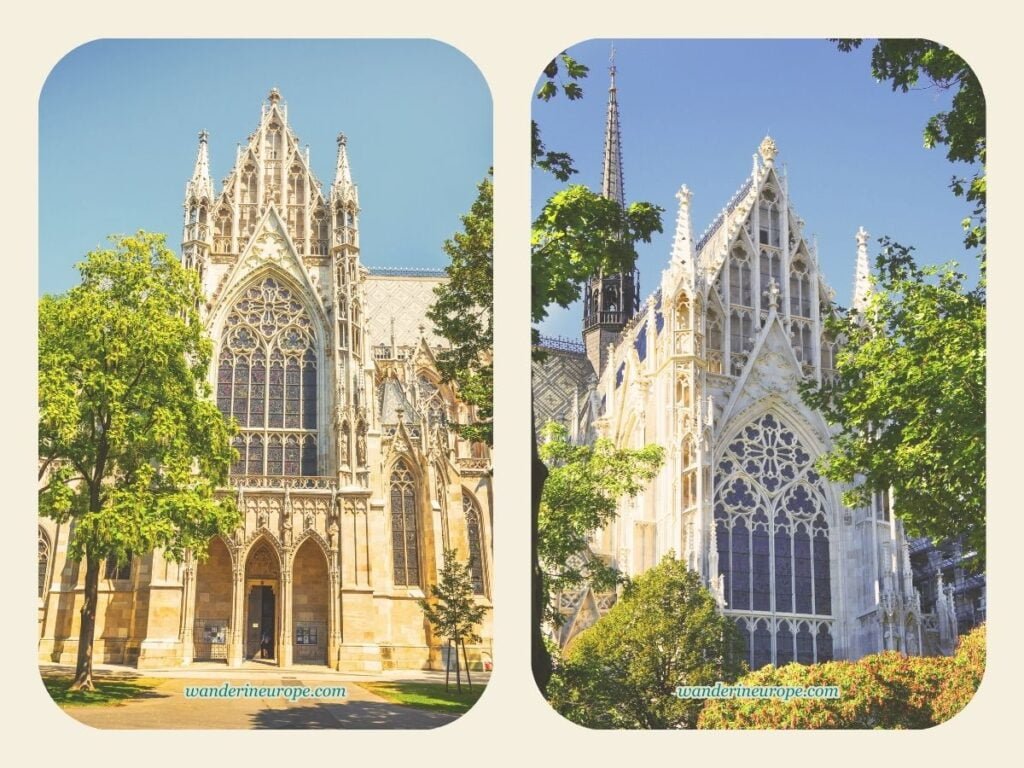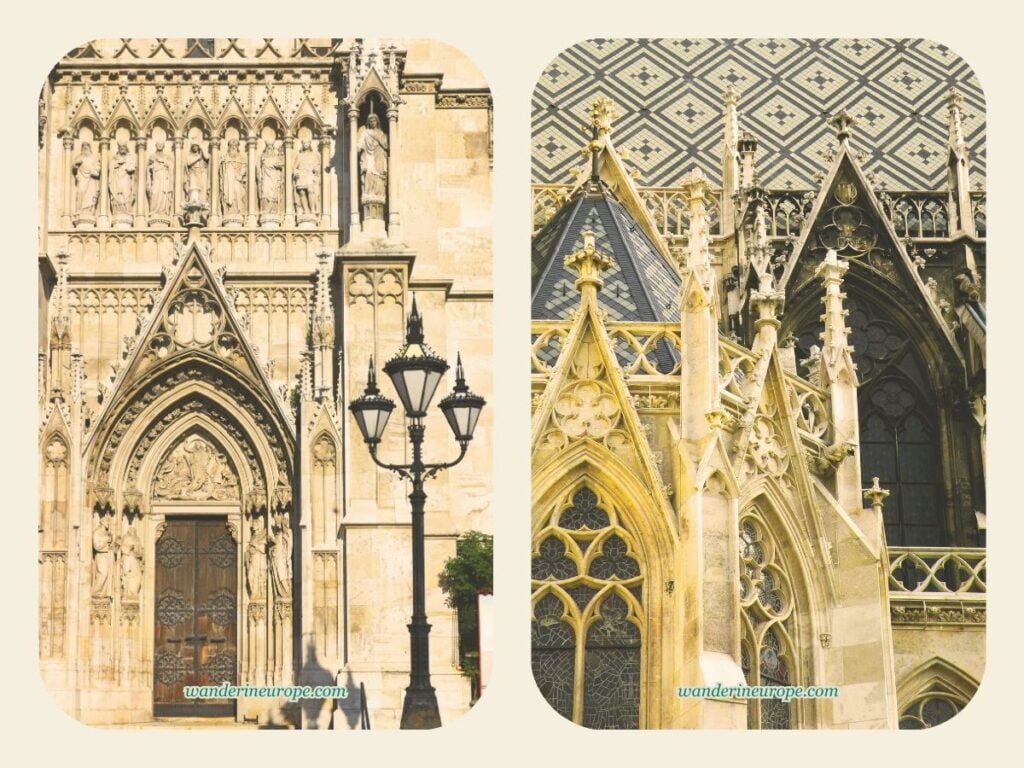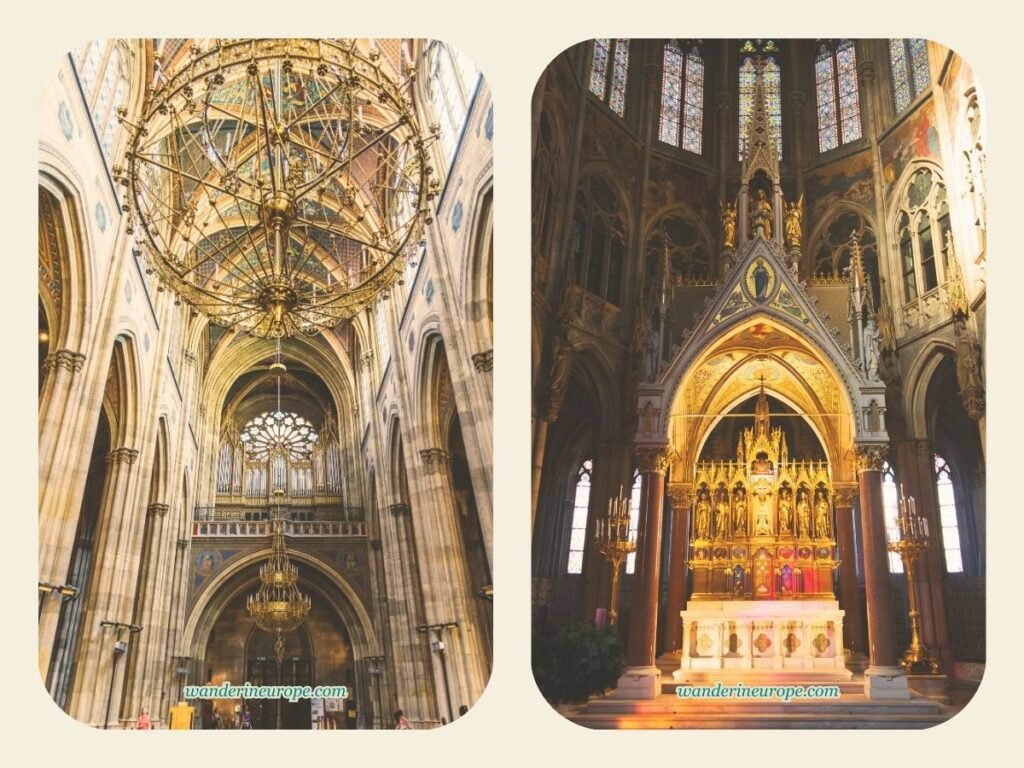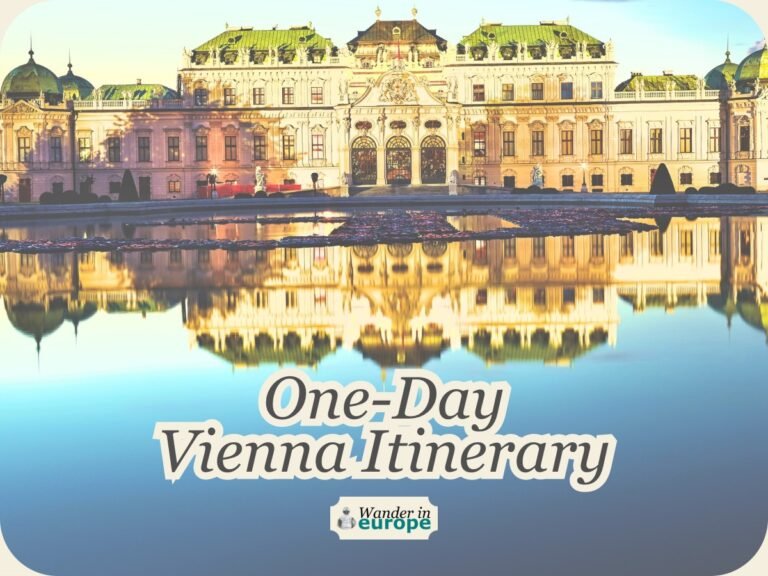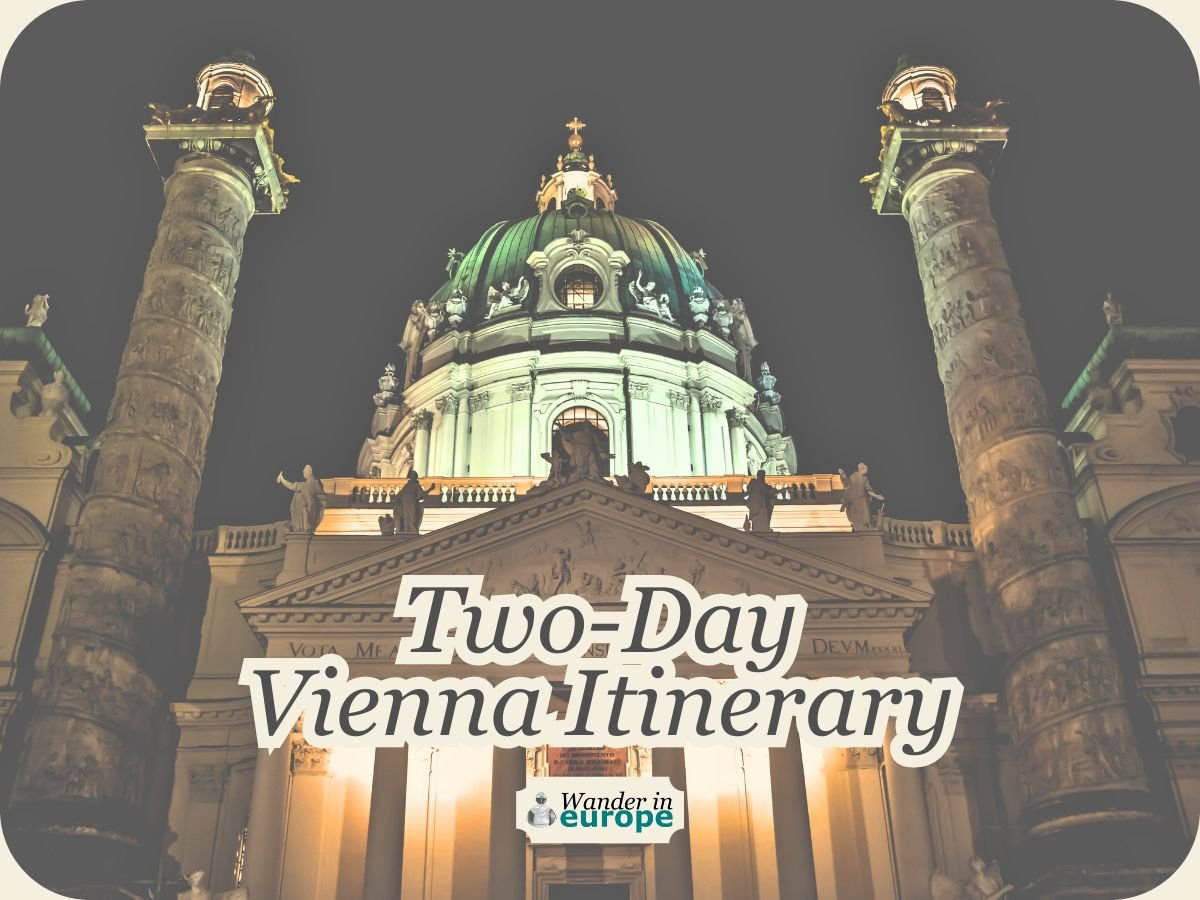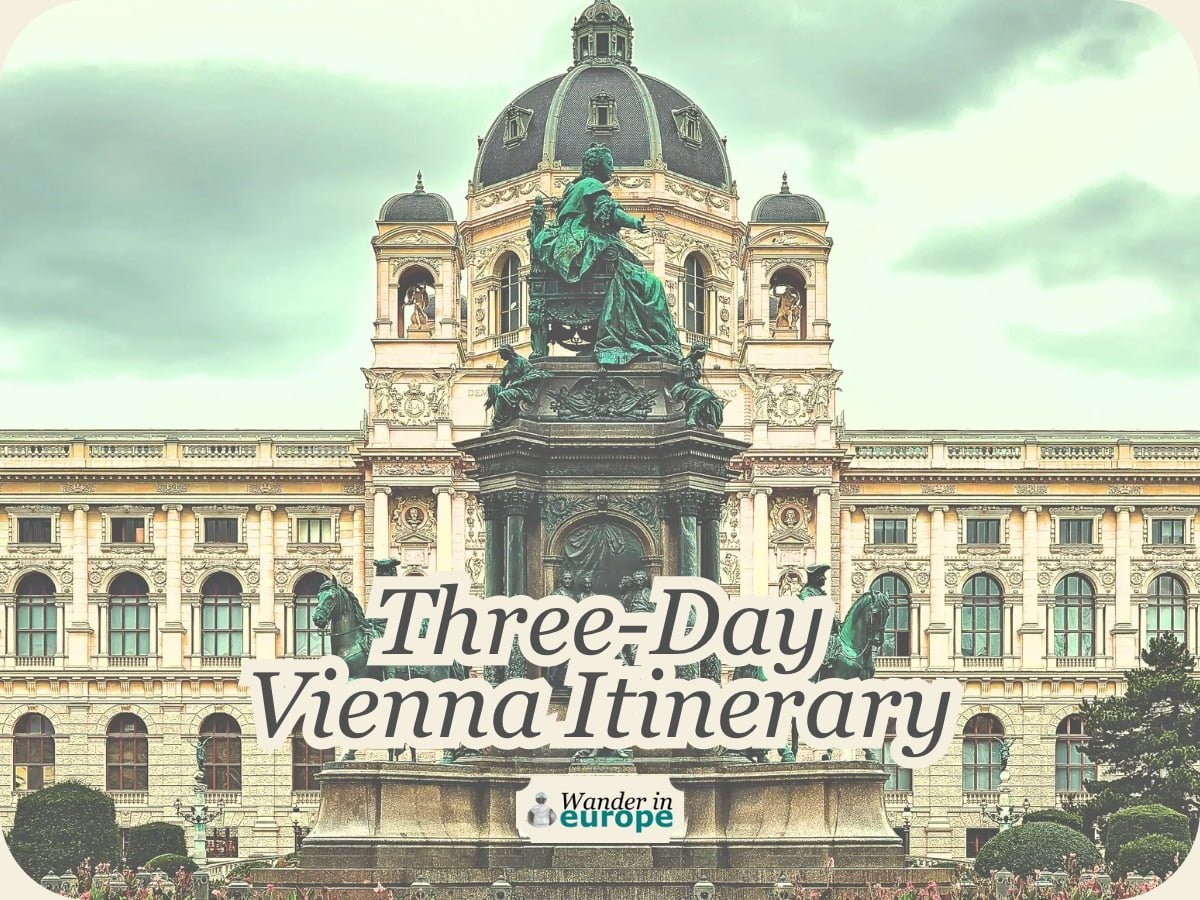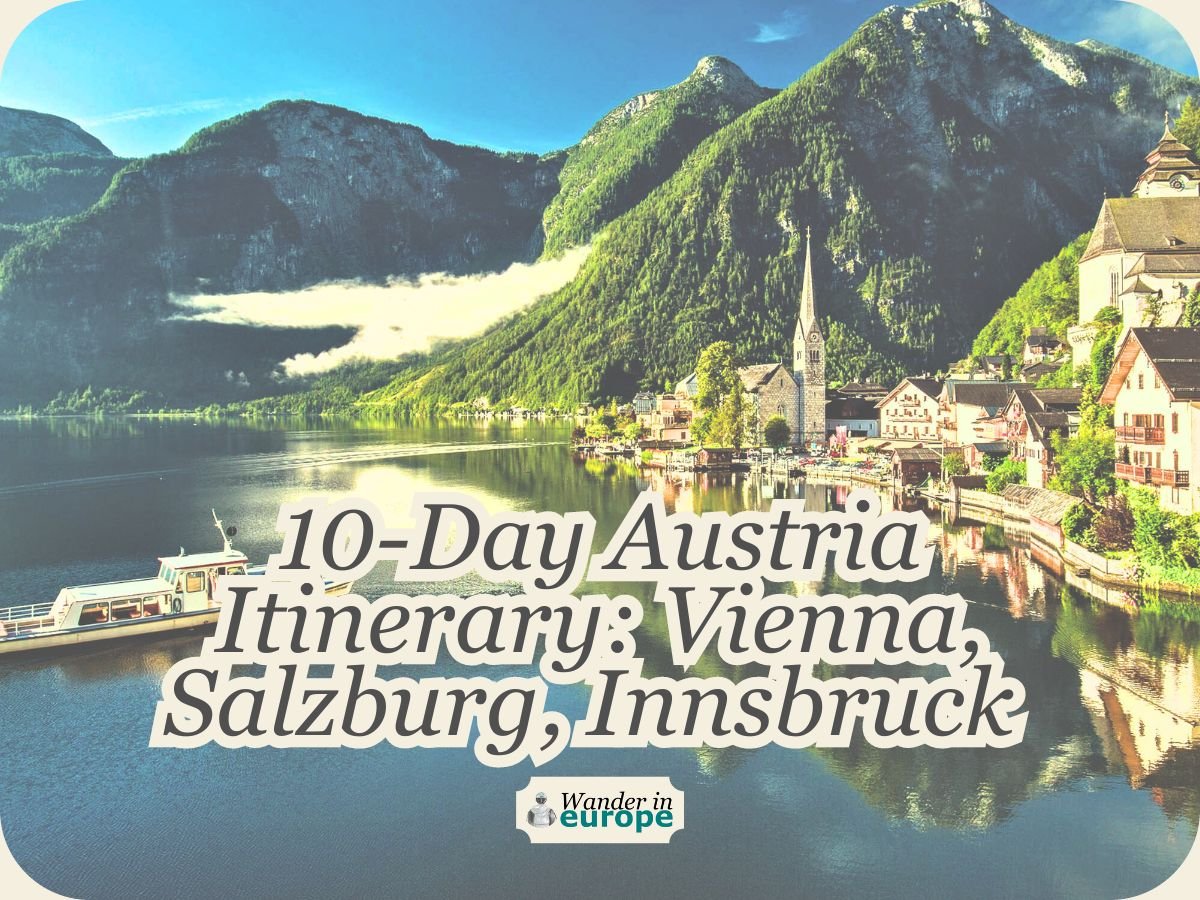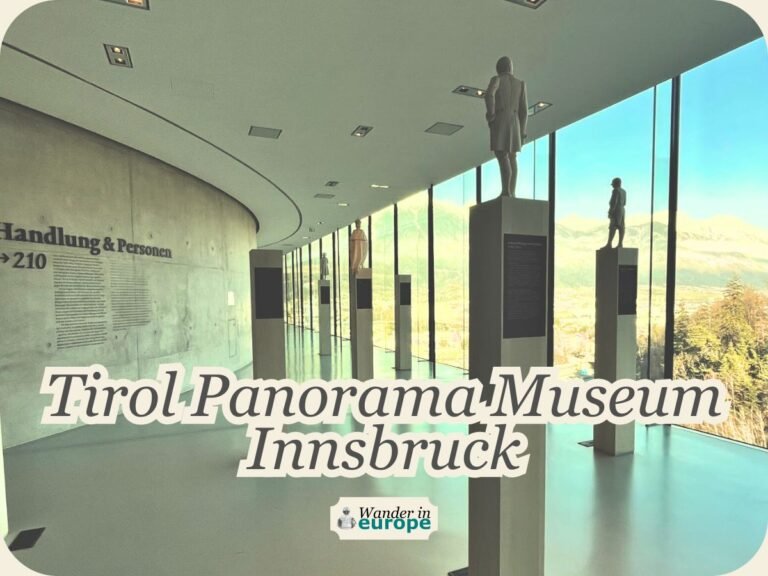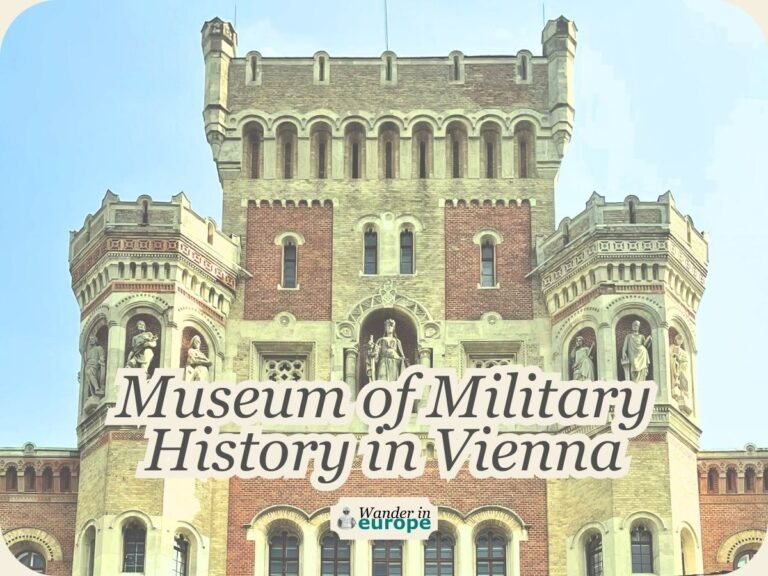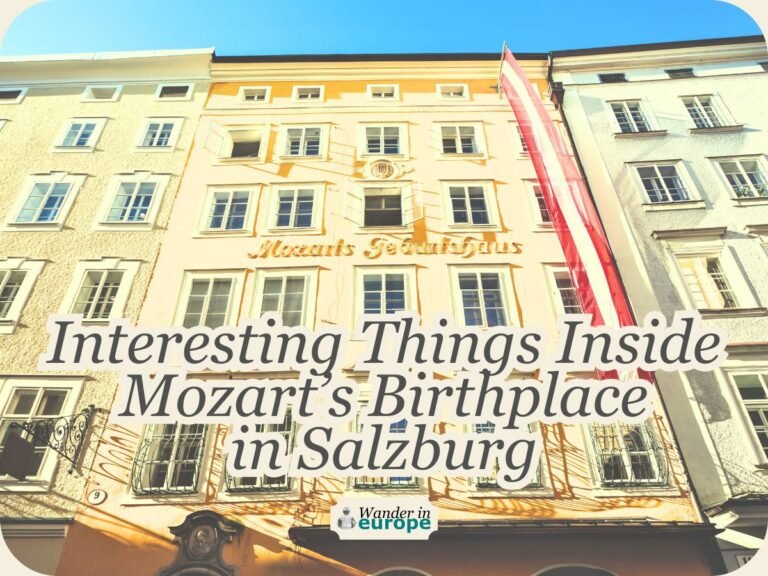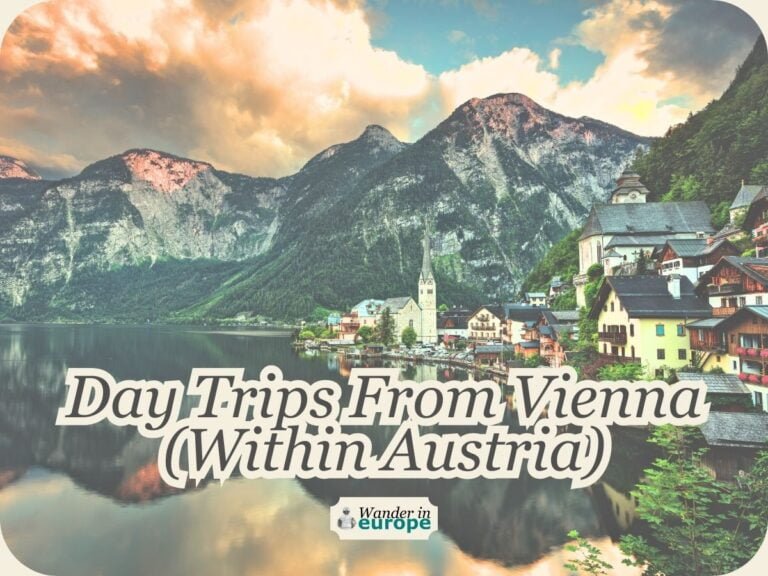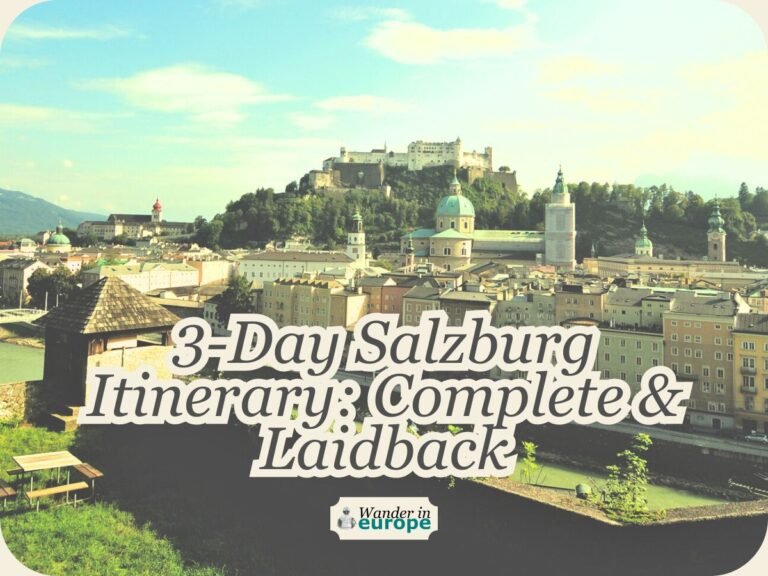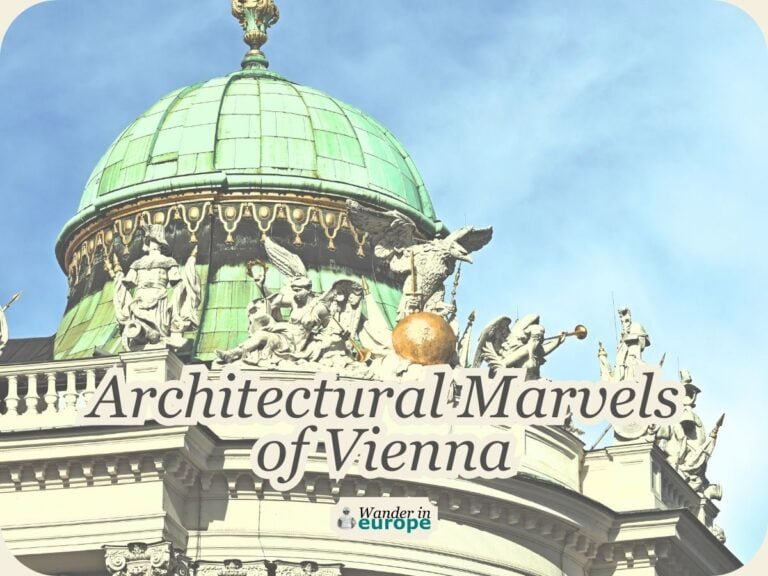Self-Guided Vienna Ringstrasse Walking Tour with Map & Route
Notes & Disclaimer: (1) Google seems to be having a hiccup. Please use other search engines to find more guides and articles from WanderInEurope. (2) This website is reader supported. And this post might have affiliate links. This means we could earn a small commission if you make a qualifying purchase. No additional cost to you. More info: Disclosure.
After seeing Vienna’s beautiful architecture, I can easily tell it has truly been a powerhouse of Europe. Opulence is eternally present in the city. The expansive palaces like Schönbrunn, Belvedere Palace, and the Imperial Palace; magnificent churches like Stephansdom, Karlskirche, and Peterskirche; and spectacular museums like the Kunsthistorisches Museum and the Museum of Military History all serve as proof.
In fact, even on Vienna’s streets, particularly on Ringstrasse, one can easily get lost in the grandeur of this beautiful imperial capital. Ringstrasse, also known as the Ring Road, is Vienna’s grand boulevard that encircles the city’s historic center. Built in the 1800s by Emperor Franz Joseph, it replaced the city’s old walls, allowing for a greater volume of traffic into the city center.
Today, some of the most beautiful buildings in the city stand on both sides of Ringstrasse. It is a slide of paradise for wanderers, photographers, and architecture enthusiasts. Exploring Ringstrasse on foot is one of the most enjoyable free activities that you can do in Vienna. The map and itinerary that I will provide will help you make the most of it, should you wish to try this amazing activity.
Note: As you’ll discover, navigating Ringstrasse is quite straightforward. However, if you’re interested in hearing insider tips from a local or unlocking secrets of this boulevard that go beyond what this article will provide, consider having a professional guide accompany you on your visit. You can choose from a group guided tour of Ringstrasse, a historical guided tour, or a private walking tour.
A glimpse of the beautiful places along Ringstrasse.
If you aren’t in a rush, please consider reading these important points.
Set your expectations
What to Expect in Ringstrasse
- Most important of all: Although Ringstrasse in Vienna is home to some stunning buildings, it’s worth noting that they don’t line the entire 5.3-kilometer or 3.3-mile stretch of the boulevard.
- The beautiful structures aren’t continuous throughout Ringstrasse. You’ll also find some unembellished modern structures along Ringstrasse, which, I believe, don’t quite fit the historical context. Keep this in mind and adjust your expectations accordingly to avoid disappointment. But rest assured, as you travel along most of Ringstrasse, you’ll be greeted by buildings that are mostly elegant and elaborate.
- It’s good to know that Ringstrasse is lined with plenty of trees, providing a pleasant shade if you’re planning to explore the boulevard on foot during the summer.
- Certain sections of Ringstrasse also have a bicycle lane, which is similarly shaded by trees. So, if you’re considering a quicker exploration of Ringstrasse by bike or Segway during a hot summer day, you won’t have to worry about overheating.
- Did you know? Thousands of lime, hackberry, and Norwegian maple trees adorn Ringstrasse. Imagine the breathtaking sight of these trees complementing the beautiful architecture when it is a sunny autumn day in Vienna.
- Another good thing to know: Some of the best parks and gardens in the city are accessible from Ringstrasse. These make for perfect spots to relax and enjoy some greenery during your walk
- Keep in mind that Ringstrasse isn’t a pedestrian-only area. Being one of the main roads in Vienna, it sees a lot of traffic from cars, trams, and buses. Although they might contribute to the noise level, they also offer a convenient way to navigate Ringstrasse quickly, particularly if your time to explore its key attractions is limited.
- Specifically, there’s a yellow tram, often referred to as the ‘sightseeing tram,’ that circles Ringstrasse. It provides a guided tour (not quite) lasting approximately half an hour, equipped with audiophones and an LED screen onboard.
- As you go on your tour, I think you’ll come to agree with me on this point: When it comes to architectural styles, Ringstrasse doesn’t disappoint. You’ll find buildings designed in Renaissance, Gothic, Baroque, and even Classical styles. Some structures even showcase a blend of these styles!
- Ringstrasse is sprinkled with little gems like the monuments of Mozart and Johann Strauß. When you explore Ringstrasse on foot, you can stumble upon these delightful surprises, which is one of the perks of not using the tram.
Note: If you want to catch all the little treasures of Ringstrasse, a tour led by a local guide could be great! Tour guides can provide fascinating insights about Ringstrasse that you might not find on any website. Don’t worrt if you’re the type who likes to explore on your own, taking in the sights and capturing photos, the maps later in this blog post will be a great help. It’ll guide you to the main attractions of Ringstrasse and some lesser-known treasures I found while wandering the boulevard.

54 Attractions along Ringstrasse (8 Highlights, 10 Notable Landmarks, and 36 Others)
54 Ringstrasse Attractions & Landmarks
Following an exploration of Ringstrasse and a thorough examination of the maps, I came across more than fifty landmarks and attractions along this iconic route. These are places and objects that I believe are either architecturally impressive or historically important, and might catch the attention of travelers on their Ringstrasse tour.
Overall, there are 54 things to see in Ringstrasse. Eight of these — I consider architectural highlights. Ten are landmarks that I deem noteworthy. The rest, a total of 36, are lesser-known gems nestled along Ringstrasse and the adjacent parks. Depending on your schedule and your interest in Vienna, it could be worth your while to check out each (or most) of these places on a walking tour along Ringstrasse. Let me give you a brief introduction to them.
Ringstrasse’s 8 Highlights
Architectural Highlights
Not only are the architectural gems of Ringstrasse the most visually stunning landmarks along the boulevard, but they also hold a great deal of importance and symbolism in Vienna. If you’re putting together a must-see list for Ringstrasse, these eight attractions are, in my view, the ones you can’t afford to miss.

- Votivkirche: The Votivkirche stands as a symbol of gratitude for the survival of Emperor Franz Joseph from an assassination attempt. Its architecture is a striking example of Neo-Gothic style, boasting twin towers that stand 325 feet tall and intricate carved stonework.
- Rathaus: Serving as the city hall of Vienna, the Rathaus reflects the democratic governance of the city. It’s a grand structure stretching over 100 meters in length along Marienplatz, topped by an 85-meter-tall tower, all in the Neo-Gothic style.
- Burgtheater: Also known as “die Burg” by the Viennese population, the Burgtheater is Austria’s national theater and one of the most important theaters in the world. The building is filled with sweeping staircases, ornate marble archways, stone carvings, oil paintings, and glorious ceilings.
- Austrian Parliament Building: The Austrian Parliament Building is a beacon of democracy, serving as the meeting place for the two houses of the Austrian Parliament. Designed by Theophil Hansen, the building is a masterpiece of Greek Revival style, complete with many columns, a triangular pediment, and countless statues.
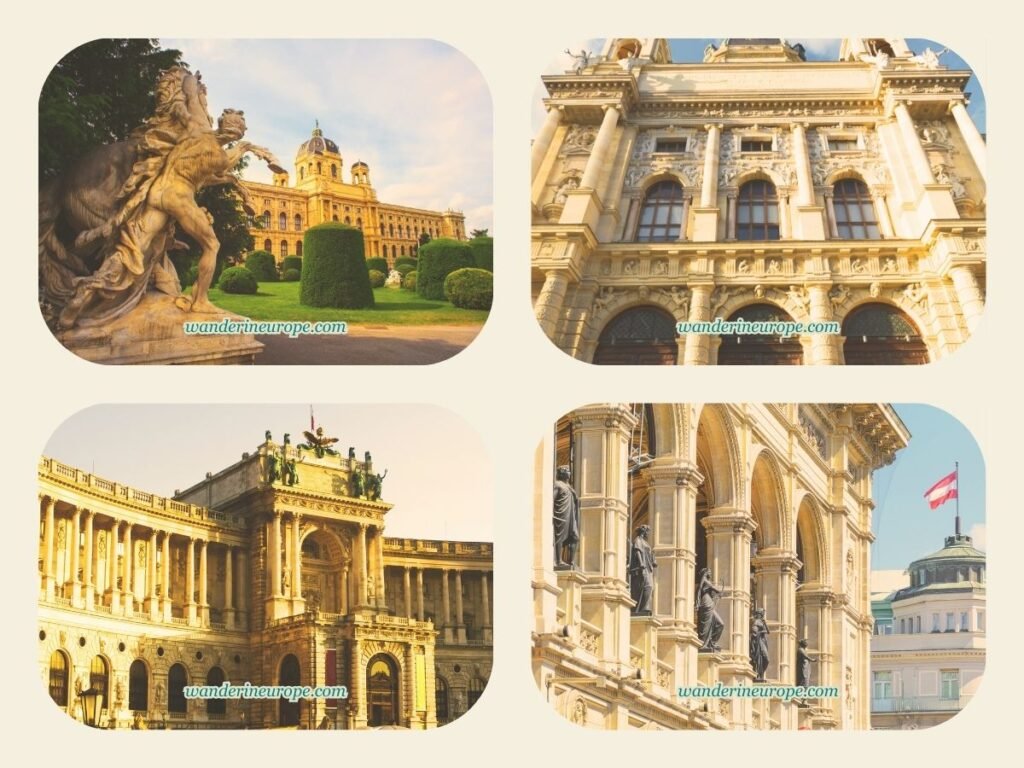
- Naturhistorisches Museum: The Naturhistorisches Museum showcases the diversity of nature, the evolution of Planet Earth and life, and the related cultural development of humankind. The museum building is filled with sweeping staircases, ornate marble archways, stone carvings, oil paintings, and glorious ceilings.
- Kunsthistorisches Museum: The Kunsthistorisches Museum houses an extensive collection of international art, making it one of the most important art museums in the world. The building itself is a magnificent neo-Renaissance structure commissioned by Emperor Franz Joseph I and opened in 1891.
- Hofburg: The Hofburg, the former principal imperial palace in the center of Vienna, has housed some of the most powerful people in Austrian history, including the Habsburg dynasty, rulers of the Austro-Hungarian Empire. It currently serves as the official residence of the President of Austria and showcases various architectural styles, from Gothic to Renaissance, Baroque, Rococo, and Classicism.
- Vienna State Opera: The Vienna State Opera is one of the top opera addresses in the world, offering a different program every day, with over 50 operas and ballet works on around 300 days per season. The building itself, opened in 1869, is a masterpiece of the Neo-Renaissance style, with elaborate stone and wood carvings, frescoes, and gold leaf ornamentation.

Ringstrasse’s 10 Notable Landmarks
Other Notable Landmarks
Ringstrasse is also lined with commercial establishments and educational institutions housed within architectural masterpieces. In fact, you can also find palaces here! These, along with other government offices and historical landmarks, are worth a stop during a walking tour along Ringstrasse to ensure a more awe-inspiring tour along the boulevard. If you have time, you can enter some of these other notable landmarks in Ringstrasse and see more impressive architecture.
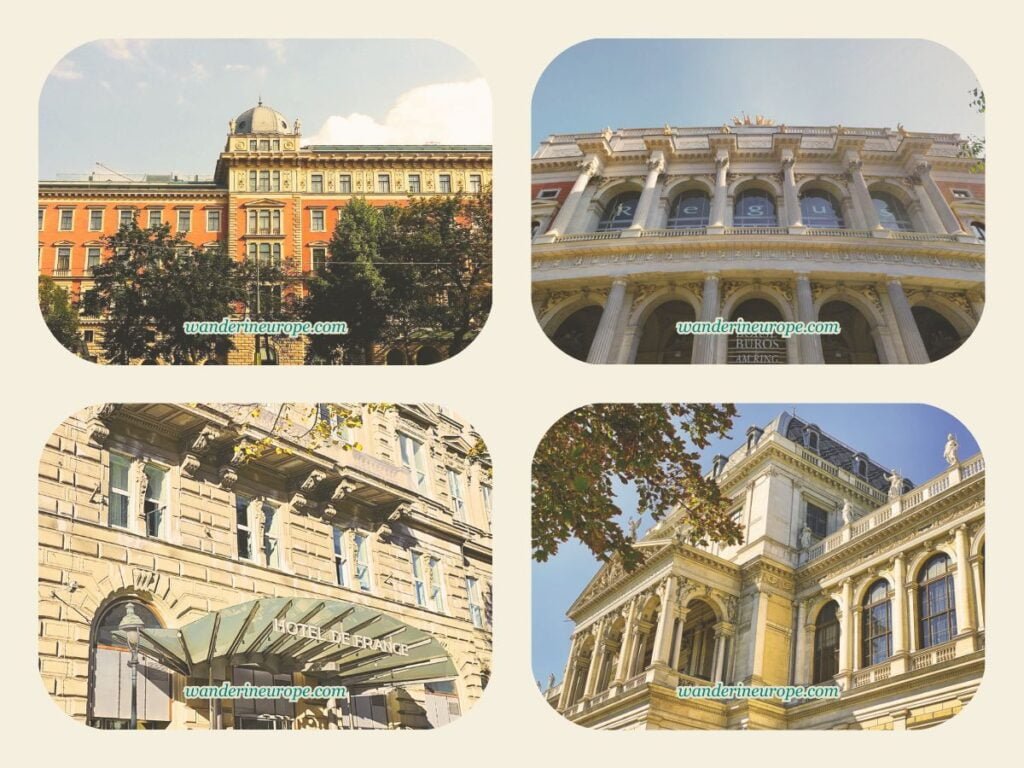
- Palais Hansen: Palais Hansen is a historicist building that was built in 1873 by Theophil Hansen for the Vienna World’s Exhibition. It is one of the most magnificent historicist buildings on Vienna’s famous Ringstrasse. The building was designed in the Renaissance revival style and is now used as a luxury hotel.
- Alte Börse: The Alte Börse, also known as the Old Exchange, is the oldest assembly building of merchants in Leipzig, Saxony, Germany. It was built in 1678 and is the city’s oldest Baroque building. The building was designed by Johann Georg Starcke, a master builder at the court of John George II, Elector of Saxony, in Dresden.
- Hotel de France: The Hotel de France is a grand structure located in Paris, showcasing the glory of the Rococo architectural style. It is known for its ivory white color and is considered a significant monument in Paris.
- University of Vienna: The main building of the University of Vienna, located on the Ringstrasse, was opened in 1884. The building was designed in the Historicist style, modeled on idealized versions of historical architectural styles but adapted to the technological and functional demands of the time in which it was built. The building represents the self-conception of a deterministic view of science, promising a “victory of light against darkness”.
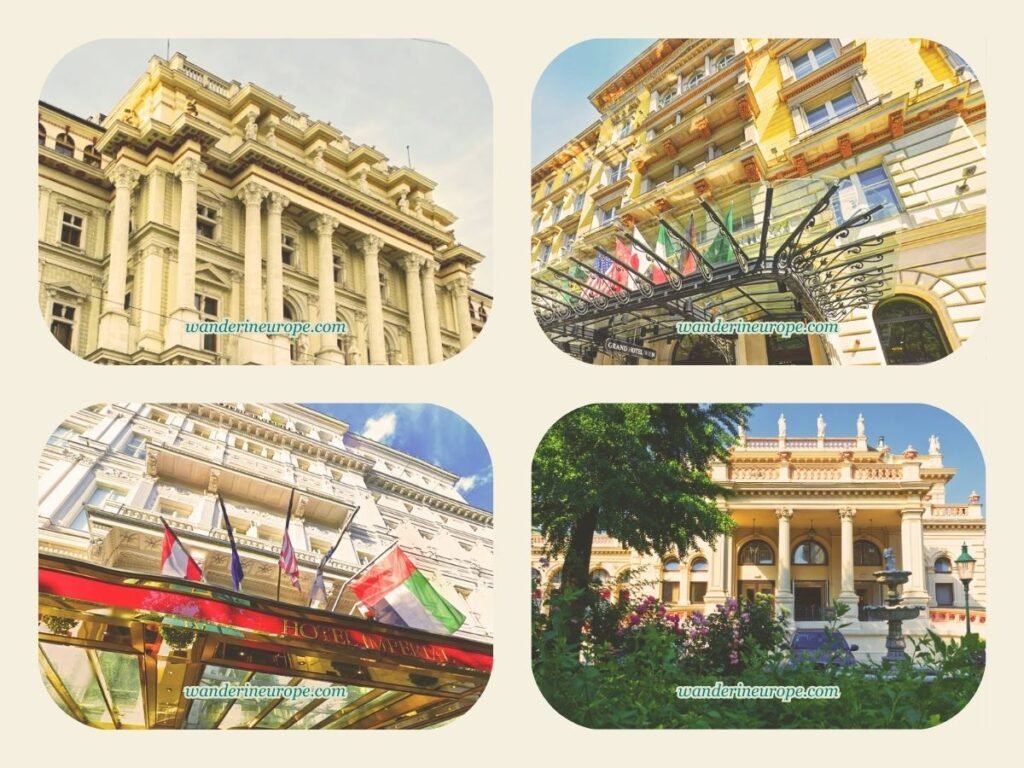
- Justizpalast: The Justizpalast, or Palace of Justice, is the seat of the Supreme Court of Austria. The Neo-Renaissance building was erected from 1875 to 1881 and is located in Vienna on Schmerlingplatz, a square near the Ringstraße boulevard in the central district of Innere Stadt.
- Grand Hotel Wien: The Grand Hotel Wien is a historicist building that was built in 1873 by Anton Schneider. It was designed in the Renaissance revival style by Carl Tietz and is now used as a luxury hotel.
- Hotel Imperial, Vienna: The Hotel Imperial, also known as The Imperial, is a five-star luxury hotel in Vienna, Austria. It is located on the Vienna Ring Road at Kärntner Ring 16, in the Innere Stadt district. The Hotel Imperial’s façade is in the Italian Neo-Renaissance style.
- Kursalon: The Kursalon is a music hall in Vienna, designed by Johann Garben in the style of the Italian Renaissance and built between 1865 and 1867.
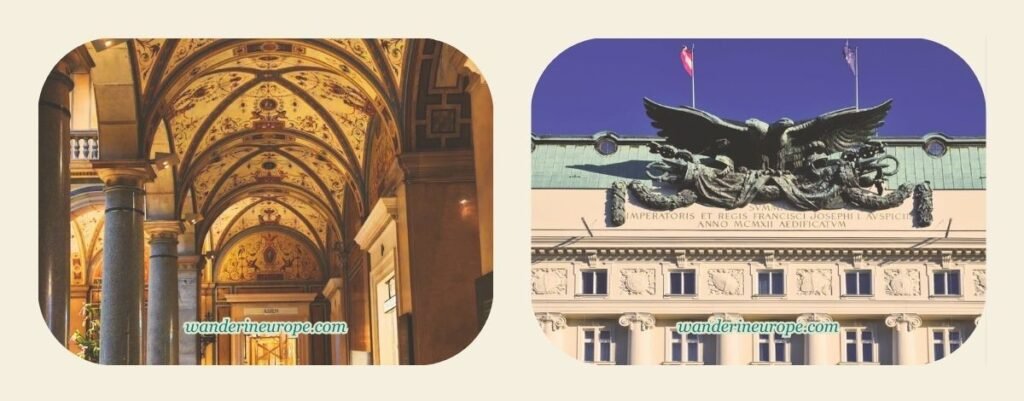
- Museum of Applied Arts: The Museum of Applied Arts is a masterpiece of Hungarian Art Nouveau, built between 1893 and 1896 to plans by Ödön Lechner and Gyula Pártos.
- Building of Federal Ministry of Social Affairs, Health, Care and Consumer Protection: Is a historical building in Vienna, notable for its neo-classist design that is adorned with different symbolisms.

Ringstrasse’s 36 Other Attractions
‘Little Gems’ & Lesser-Known Attractions
Walking around Ringstrasse, you’re bound to discover little treasures scattered throughout Vienna. These could be historical monuments, remnants of bygone eras, charming fountains, or striking artworks that are just begging to be photographed. You’ll find most of these gems nestled within the city’s green spaces. Some are situated next to larger, well-known landmarks, while others are right there in the middle of the street, easy to spot.

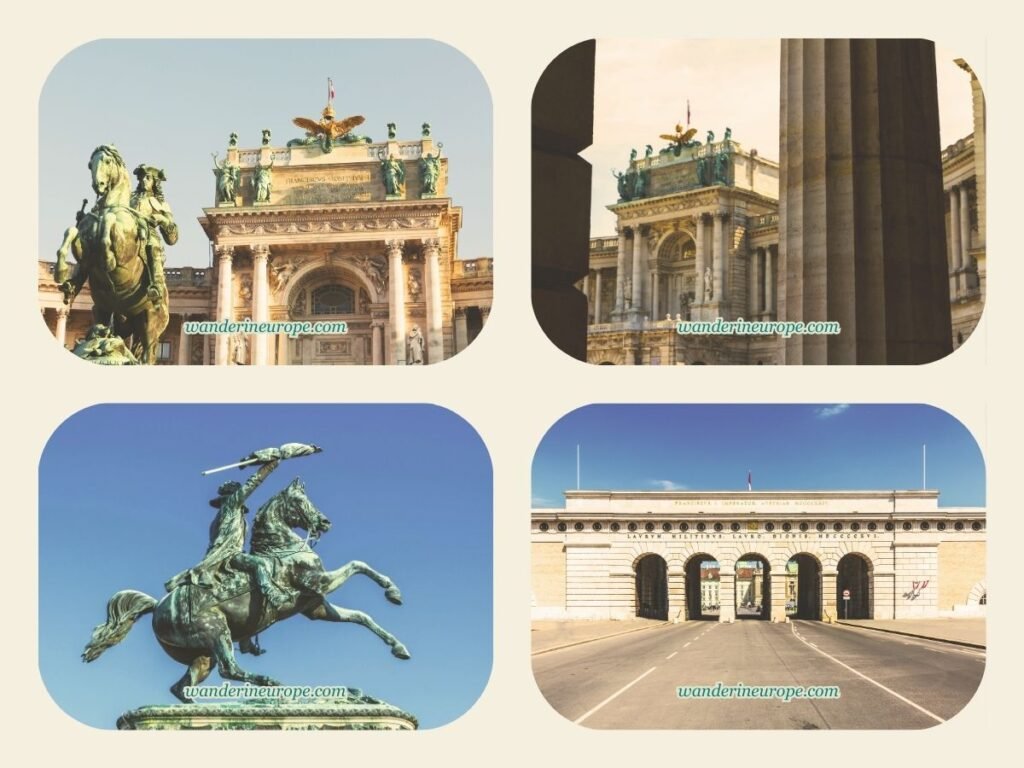
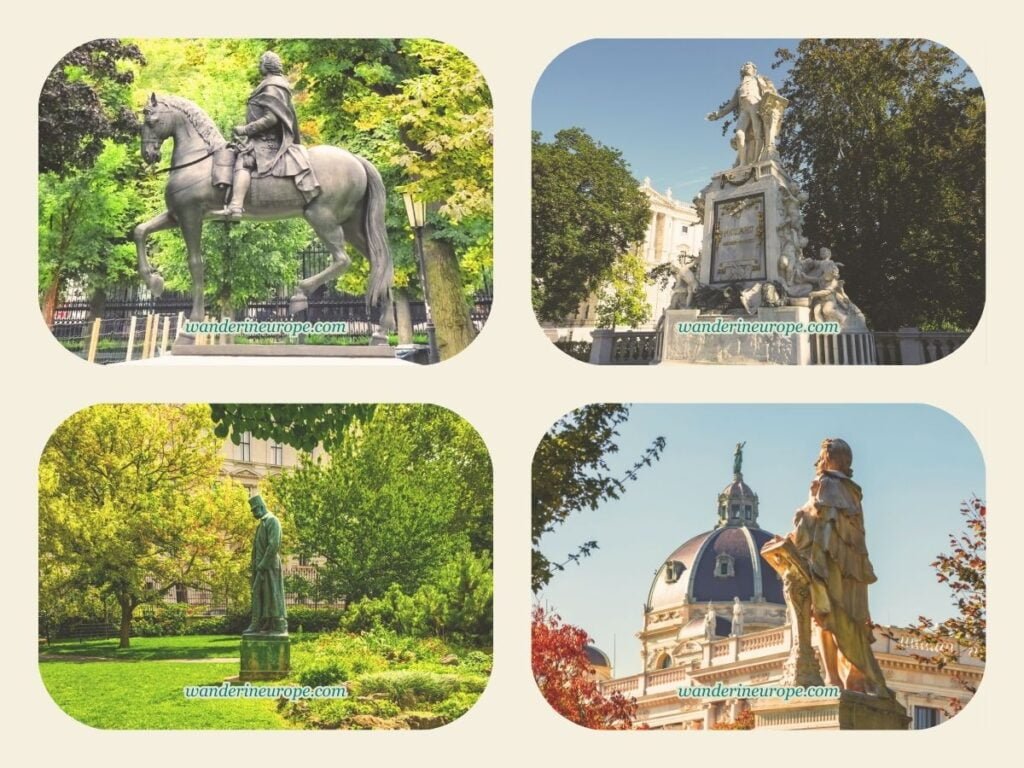
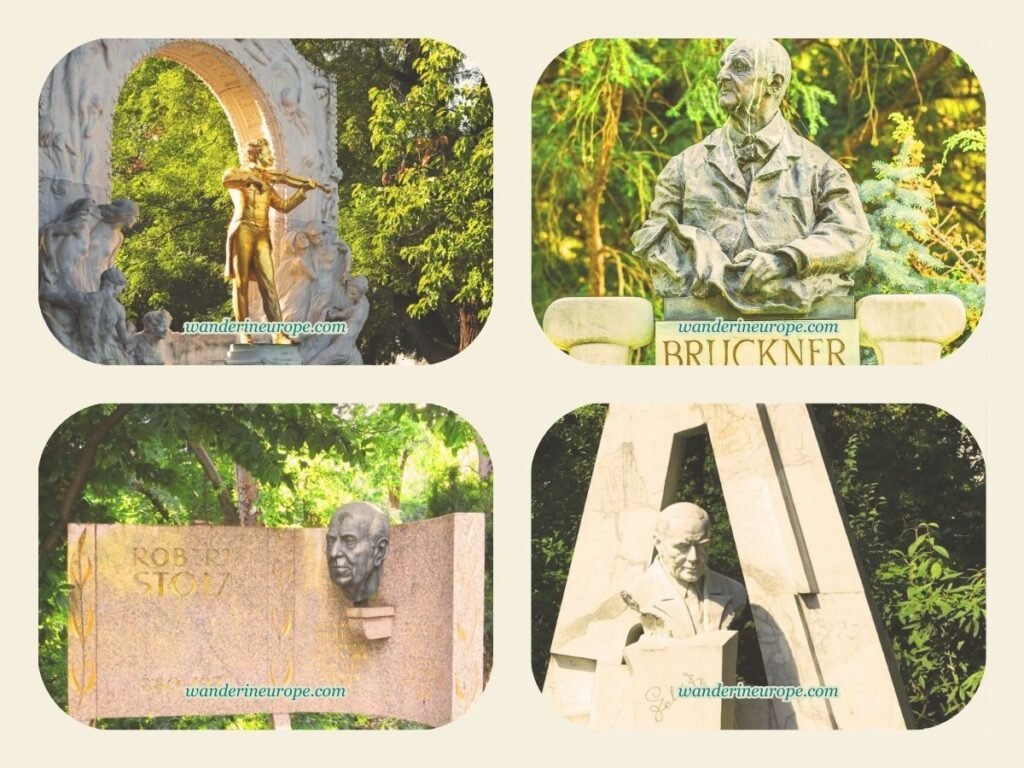
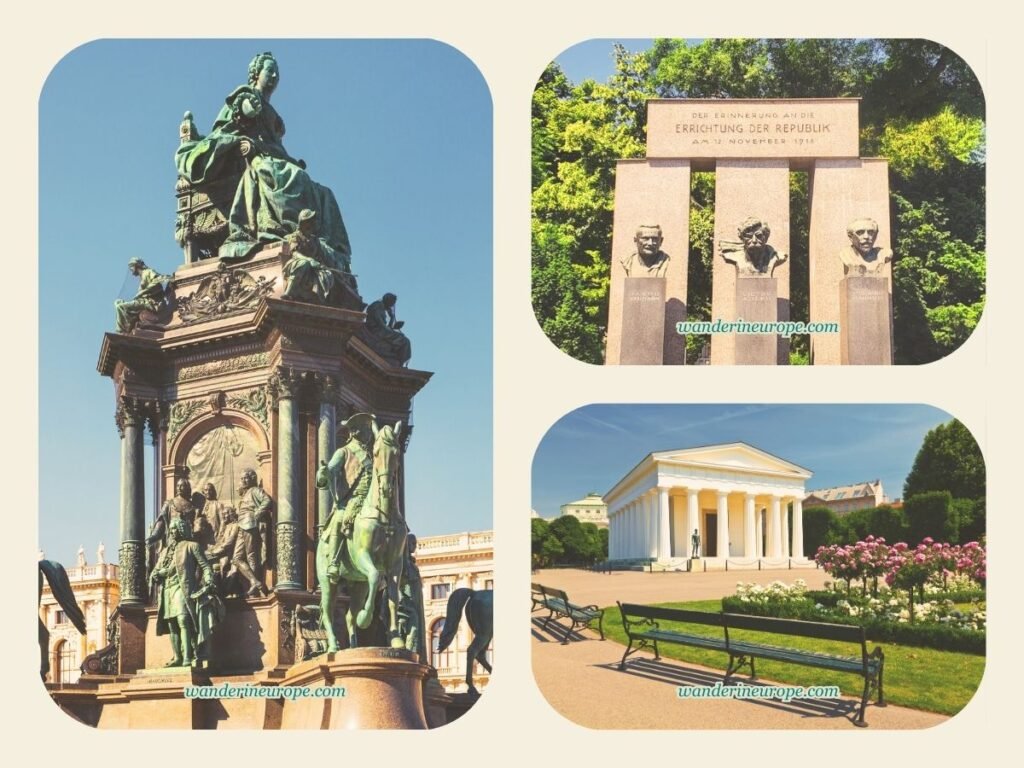
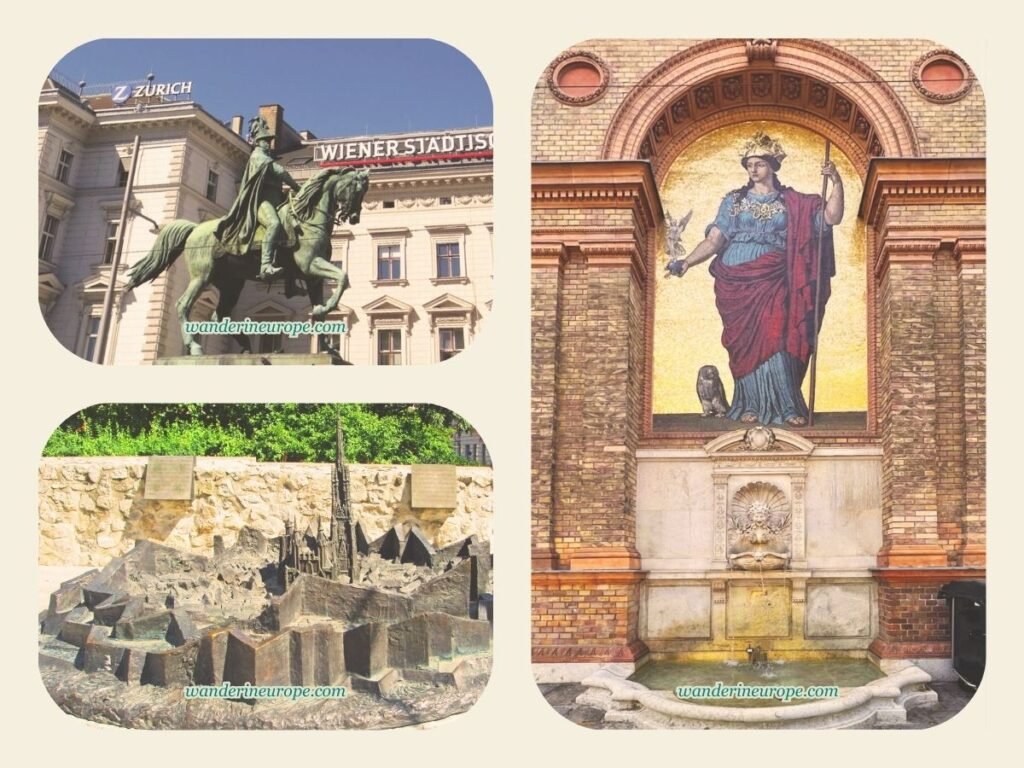
| Park/Garden/Square | Little Gems |
|---|---|
| Rathausplatz | Joseph von Sonnenfels Statue, Nicholas (Count of Salm) Statue, Count Leopold Kollonits Statue Duke Leopold the Glorious Statue, Karl Seitz Statue, Henry II Jasomirgott Statue, Count von Starhemberg Statue, Duke Rudolf IV Statue Fischer von Erlach Statue, Theodor-Körner Statue, Dr. Karl Renner Monument, Strauss Lanner Monument, Waldmüller Monument, and Adolf Schärf Monument. |
| Heldenplatz | Outer Castle Gate, Prince Eugene Monument, and Archduke Karl Monument |
| Burggarten | Mozart Monument, Franz Joseph Monument, Franz Stephan von Lothringen Monument, Goethe Monument, and Hercules & The Nemean Lion Fountain |
| Stadtpark | Johann Strauss Monument, Emil Jakob Schindler Monument, Anton Bruckner Monument, Robert Stolz Monument, Hans Makart Monument, Schubert Monument, Andreas Zelinka Monument, Franz Lehár Monument |
| Other landmarks | Theseustempel, Republic Monument Maria Theresa Monument, Karl Philipp (Prince of Schwarzenberg) Monument, Goethe Monument, Alte Stadtmauer Stubentor, and Minervabrunnen |
Note: My top picks among these are the Maria Theresa Monument, situated between the Naturhistorisches and Kunsthistorisches museums, and the Prince Eugene Monument at Heldenplatz. Their intricate details and the picturesque backdrop of nearby buildings make them stand out. Also, don’t miss the Minervabrunnen by the Museum of Applied Arts. I personally think it’s the most captivating fountain in Vienna.

Maps of Ringstrasse
You might be curious about the exact locations of the architectural marvels, significant buildings, hidden gems, or even the Ringstrasse itself in Vienna. The maps provided below should help you pinpoint their locations in the city.

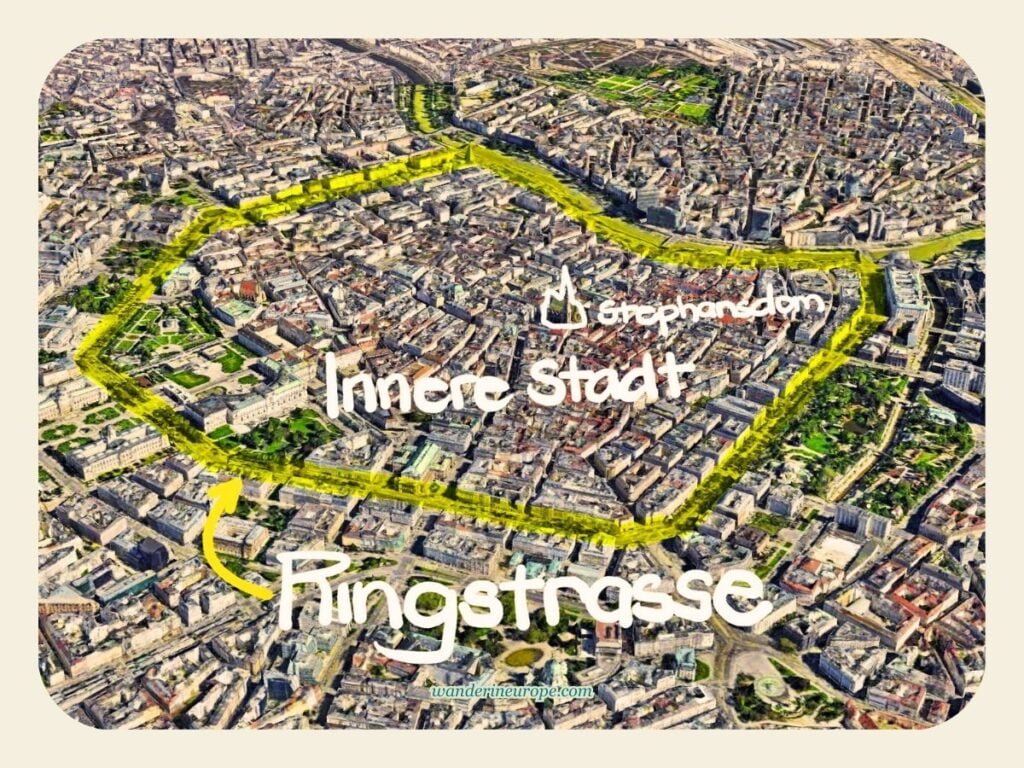


The map above provides the full picture of the locations of the attractions along Ringstrasse. The red highlights point out the architectural marvels, while the blue ones mark the notable landmarks. The locations marked with violet arrows and numbers represent the little gems you can discover there, indicating both their location and quantity.
For a closer look or more detailed maps and additional information, please expand the sections below.
Ringstrasse Road Segments — Important
Road Segments Map
Before you start exploring Ringstrasse, it’s important to know that it’s divided into different sections, each with its own name. The landmarks along Ringstrasse use these section names in their addresses. For instance, the Vienna State Opera is located at ‘Opernring 2, 1010 Wien’. If you’re not a fan of using smartphones for navigation, knowing these street segment names and their sequence can give you an advantage when finding your way around Ringstrasse. You’ll typically find the names of the street segments displayed on dark blue signs mounted on street posts.
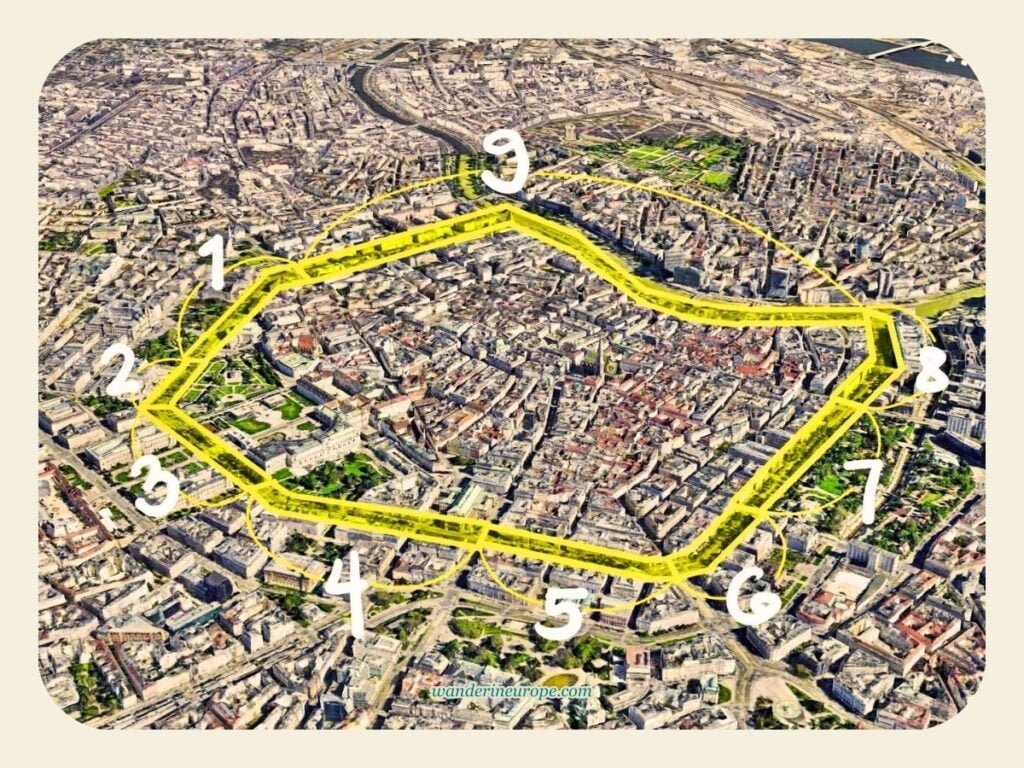
(1) Universitätsring (2) Dr.-Karl-Renner-Ring (3) Burgring (4) Opernring (5) Kaerntnerring (6) Schubertring (7) Parkring (8) Stubenring (9) Schottenring
Ringstrasse Architectural Highlights
Architecture Highlights Map
If your plan is to focus on the architectural highlights along Ringstrasse, you’ll only be exploring four key segments: Universitätsring, Dr.-Karl-Renner-Ring, Burgring, and Opernring. It’s a 30-minute walk from Votivkirche to Vienna State Opera, and that’s without stopping. Depending on your pace for sightseeing, snapping photos, and resting, I’d recommend setting aside at least 2 hours. This time estimate includes brief stops at parks and other notable landmarks along these four sections of Ringstrasse.
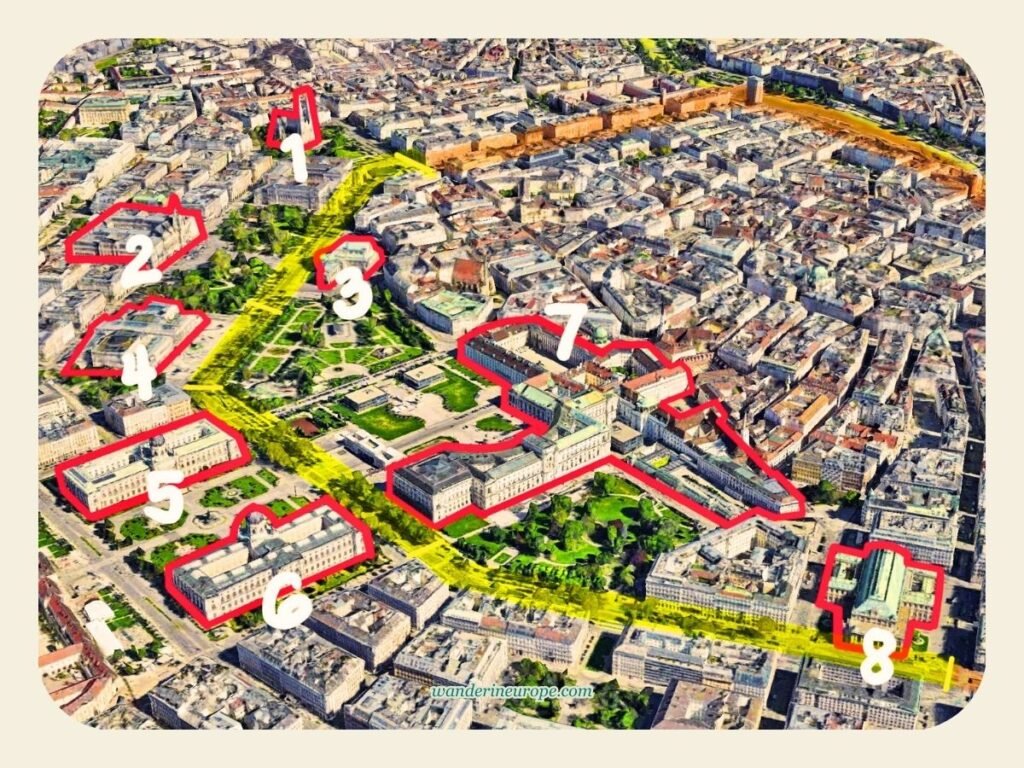
(1) Votivkirche (2) Rathaus (3) Burgtheater (4) Austrian Parliament (5) Naturhistorisches Museum (6) Kunsthistorisches Museum (7) Hofburg (8) Vienna State Opera
Ringstrasse Other Notable Landmarks
Other Notable Buildings Map
Suppose you have half a day or four hours and you’re in the mood for a ‘wandering spree’ in Vienna. In that case, you might be able to take in all the significant buildings and architectural gems of Ringstrasse. From Palais Hansen to the Building of Federal Ministry of Social Affairs, it’s a direct one-hour walk. The other three hours can be used for brief rests, photo ops, and a quick look at some of the landmarks and parks along Ringstrasse.
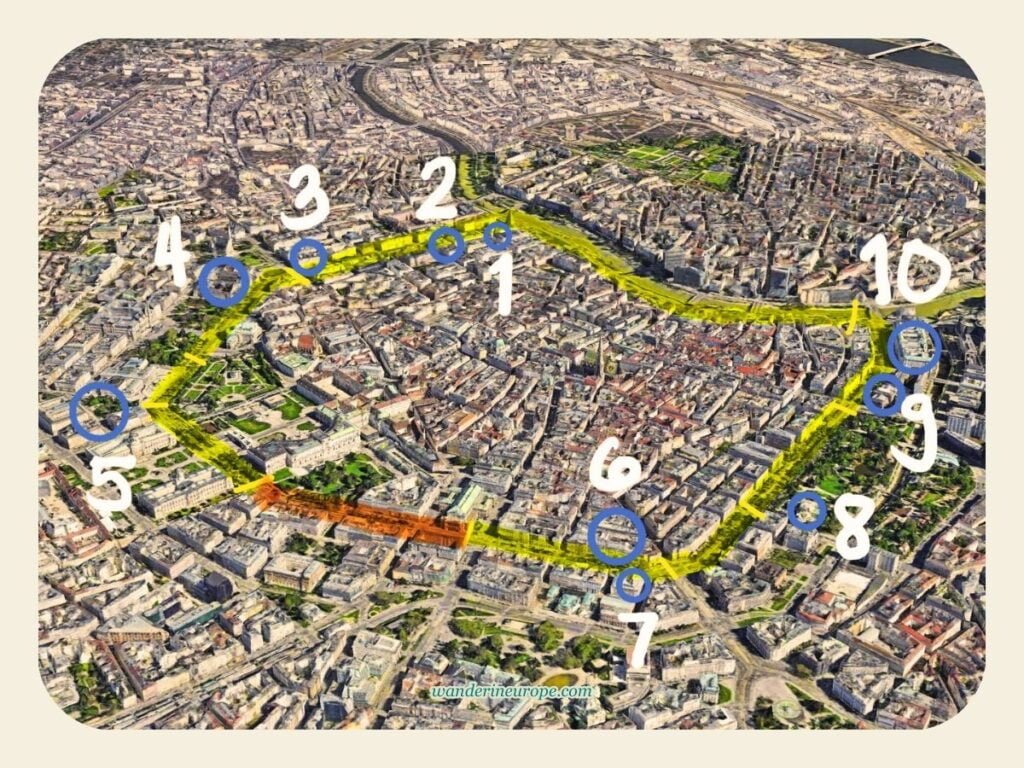
(1) Palais Hansen (2) Alte Börse (3) Hotel de France (4) University of Vienna (5) Justizpalast (6) Grand Hotel Wien (7) Hotel Imperial, Vienna (8) Kursalon (9) Museum of Applied Arts (10) Building of Federal Ministry of Social Affairs, Health, Care and Consumer Protection
Ringstrasse Little Gems and Lesser-Known Attractions
Ringstrasse Little Gems Map
Should you wish to see the majority of Ringstrasse, including the small gems, you might need to set aside an entire day. I would suggest this only if you have additional time to spend in Vienna.
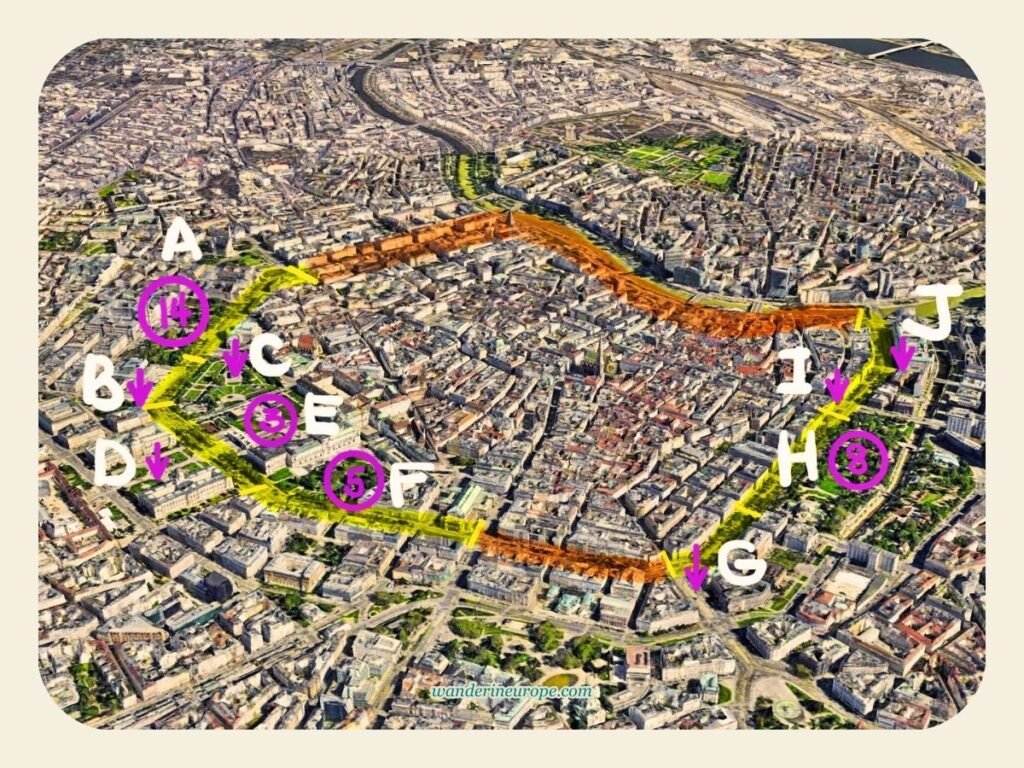
A. Rathausplatz (14) | B. Republic Monument | C. Theseustempel | D. Maria Theresa Monument | E. Heldenplatz (3) | F. Burggarten (5) | G. Karl Philipp (Prince of Schwarzenberg) Monument | H. Stadtpark (8) | I. Alte Stadtmauer Stubentor | J. Minervabrunnen
Walking Tour Itinerary
Whether you’re a casual tourist or an avid explorer, I recommend setting aside half a day (at most) to explore Ringstrasse, especially since there are other places in Vienna where it is recommended to spend more time at.
For a walking tour, it’s a great idea to cover the entire length of Ringstrasse (excluding the part of Schottenring that runs along the Danube Canal). But if it’s your first time in Vienna, focusing on the architectural highlights, notable buildings, and hidden gems within these four segments of Ringstrasse should be enough: Universitätsring, Dr.-Karl-Renner-Ring, Burgring, and Opernring. It should also be more practical.
As for when to start exploring, that’s up to you.
But if you’re into photography, you might want to start your Ringstrasse walking tour three or four hours before sunset. That way, you can take advantage of the golden hour, which makes the city’s architectural landmarks look even more dramatic. I suggest starting your walking tour of Ringstrasse at the Vienna State Opera and ending it at Votivkirche, which I think is one of the best places to watch the sunset in Vienna. The gothic spires and flying buttresses of Votivkirche, bathed in the warm light of the setting sun, are truly a sight to behold.
Now, let me give you an itinerary based on my recommendations. This itinerary focuses on sightseeing. You’ll get a chance to see the interiors of some of the landmarks, but we’ll save exploring the exhibits inside the museums housed within beautiful buildings for another part of the day.
First Stop: Vienna State Opera
Let’s start our walking tour at the Vienna State Opera. No matter where you are in the city, it’s easy to get to. There are bus, tram, and underground train stops (Oper, Karlsplatz), just a few steps from the entrance. As one of the most important opera houses in the world and a masterpiece of Neo-Renaissance architecture, it’s a must-see on your walking tour of the Ringstrasse.

Map, Route, and Pictures

Fun facts, tips, and more information
Did you know that the Vienna State Opera has the largest repertoire in the world? It presents around 350 performances of over 60 different opera and ballet works each season. Plus, the orchestra of the Vienna State Opera is none other than the world-renowned Vienna Philharmonic.
Talking about the architecture: The interiors of the opera house are richly decorated and a feast for the eyes. From the grand staircase to the Schwind Foyer and the Auditorium, there’s so much to see.
If you like, since the Vienna State Opera is the first stop of this Ringstrasse walking tour, you can tour the interiors of the opera before you really start exploring Ringstrasse.
Vienna State Opera offers guided tours that last about 40 minutes. You’ll get to see the foyer, the Grand Staircase, and the ceremonial rooms. You’ll also get a view of the auditorium from the stage. It’s a great way to learn about the history and architecture of the opera house. For more information, the link to the official website of Vienna State Opera is linked at the resources section of this post.
You don’t need to enter the Vienna State Opera to get impressed by its architecture, though. Its exteriors are already noteworthy. Take note of the Equestrian Statues above the main entrance, representing Harmony and the Muse of Poetry. Also, check out the intriguing allegorical fountains on each side of the opera house.
On the right side, you’ll find the fountain with the statue of the Siren, Lorelei, supported by sculptures representing love, grief, and revenge. On the other side, you’ll find the fountain that illustrates dance, music, and joy — the very things an opera house brings to its visitors.
Second Stop: Burggarten
Next on your walking tour of Ringstrasse is Burggarten. It’s just a three-minute walk from the Vienna State Opera, across one block and Operngasse. Once part of the glacis in front of the Vienna City Wall, Burggarten is now one of Vienna’s most charming parks.

Map, Route, and Pictures

Fun facts, tips, and more information
Burggarten is a wonderful stop on your walking tour because it is not just beautiful with its picturesque views of the rear facade of Hofburg’s Neue Burg, but it’s also home to monuments of some of Austria’s most celebrated personalities. You’ll find tributes to Mozart, Franz Stephen, and Franz Joseph right here in this garden. Be sure to check out the Mozart monument, which features a giant G Clef garden art in front.
Actually, just before you get to Burggarten from the Vienna State Opera, you’ll come across the monument of Goethe. This monument depicts a significant figure in the empire’s history – a renowned 18th-century German poet and writer. His most famous work, the novel ‘Faust,’ is considered one of the greatest pieces of world literature.
You see, a visit to Burggarten is like a brief journey through Austria’s rich heritage and history. And there’s more! Occasionally, you might even spot a few Lipizzaner horses from the Spanish Riding School wandering around Burggarten. The tradition of breeding these horses is recognized as a UNESCO Intangible Cultural Heritage.
In Burggarten, you’ll also find a beautiful fountain called the Hercules Fountain. It’s an excellent place to snap some photos, particularly with the beautiful reflections of the statue on the water. What’s remarkable about this statue is that it was crafted as far back as 1770, but it wasn’t until 1948 that it was placed in the middle of the pond
Third Stop: Heldenplatz
From Burggarten, head over to Heldenplatz. This is the square situated in front of the Neue Burg, or the New Castle, of the Imperial Palace, also known as Hofburg. You’ll find it’s only a minute’s walk from Mozart’s Monument in Burggarten if you take the path along Burgring. To me, Heldenplatz is another one of the most picturesque squares in the city, thanks to the facade of Neue Burg covering the entire southeast perimeter of the square. On this square, you’ll see why Hofburg is an architectural highlight of a walking tour along Ringstrasse.

Map, Route, and Pictures

Fun facts, tips, and more information
In Heldenplatz, you can also find the statue of Prince Eugene—a successful military leader who fought against the Ottomans during the Siege of Vienna. You can photograph his statue with Neue Burg in the backdrop for an epic shot. Across from the monument of Prince Eugene, you’ll find the Equestrian statue of Archduke Karl. It’s as if he’s poised to engage Prince Eugene in battle.
This particular statue in Vienna always reminds me of the painting ‘Napoleon Crossing the Alps’. The reason being the way the Archduke is depicted in his position on the horse, with two of its feet raised in the air. I would venture to guess that the statue of Archduke Karl was designed in such a manner due to his significant role during the Napoleonic Wars.
Speaking of the Napoleonic Wars, the triumphal arch that you’ll see on the western side of Heldenplatz (the one near Burgring), was built to commemorate the Austrian victories over Napoleon. Some call it the Heroes Monument, in honor of the veterans of the Napoleonic wars. However, it is also called the Outer Castle Gate, being a remnant of the fortification walls that were dismantled to be replaced by Ringstrasse.
Under the arches of the Outer Castle Gate, you can get a picturesque view of Hofburg, framed by the columns of the edifice. On the other side of the Outer Castle Gate, you’ll then see the city’s two impressive palatial museums: The Kunsthistorisches and Naturhistorisches Museum.
Fourth Stop: Volksgarten
To me, among the gardens in Vienna, Volksgarten is the most well-designed, well-maintained, and picturesque that is not a part of a palace. It’s located just beside Heldenplatz. You won’t have any trouble looking for Volksgarten during your walking tour of Ringstrasse.

Map, Route, and Pictures

Fun facts, tips, and more information
If you’re planning a summer visit, the sight of flowers blooming everywhere is sure to make you smile. When I explored the garden, I was struck by the variety of roses, each one a different color! There are plenty of benches under shady trees, too, perfect for a quick break or even a picnic.
Sure to catch your eye as you wander within Volksgarten is the Theseustempel. This Greek-style temple, in the heart of the garden, is begging to be photographed with the surrounding flowers and plants. Theseustempel houses unique art exhibits. If you have the opportunity to visit during its opening hours, I suggest you do so. The last time I checked, there was a fascinating temporary exhibition called “Bottled Ocean,” which was a representation of the ocean made entirely of plastic pieces.
Apart from Theseustempel, another element that adds to the picturesque quality of Volksgarten is the architectural highlights of Ringstrasse that surround it. From the garden, you can spot the Hofburg, Naturhistorisches Museum, Burgtheater, Austrian Parliament, and even the Rathaus! Their majestic domes and spires peek over the trees of the Volksgarten. Because of these landmarks, it seems that every spot in the Volksgarten is a photo opportunity.
My favorite scene is on the southwestern side of the park, where you can photograph the Franz Grillparzer Monument with the roof and dome of the Naturhistorisches Museum in the background. Make sure you also visit the beautiful flower beds that run parallel to Ringstrasse, and then face north. From there, you can see the majestic Burgtheater, perfectly aligned with the design of the flowerbed.
If you’re an architecture enthusiast, I’m sure you’ll hear the Burgtheater whispering this inside your head: “Come closer and see my beauty!” Well, don’t hesitate. The Burgtheater is one of the buildings you’ll see in Vienna with stunning exteriors! If the north gate of the Volksgarten is open, you can use it to get closer to the Burgtheater and appreciate its architecture up close. However, the best view of the Burgtheater is located in Rathausplatz, which is another stop on this Ringstrasse walking tour.
Fifth Stop: Austrian Parliament and Justizpalast
Across Universitätsring from Volksgarten, you’ll find the Austrian Parliament Building and Justizpalast, another architectural highlight and notable landmark in Vienna along Ringstrasse. On this part of the Ringstrasse walking tour, you’ll encounter numerous photo opportunities. However, it’s important not to miss appreciating their architecture, which is both imposing and symbolic.

Map, Route, and Pictures

Fun facts, tips, and more information
I recommend visiting the Justizpalast first, then the Austrian Parliament Building for a seamless route to the next parts of this walking tour. There’s a pedestrian lane crossing Burgring near the long parking lot between Heldenplatz and Volksgarten; please use it to get to the Justizpalast. After crossing the road, walk northward towards the Austrian Parliament.
Before you reach the Austrian Parliament Building, you’ll find Grete-Rehor Park, where the Republic Monument is located. This monument was unveiled on the 10th anniversary of the Republic in 1928, but it remained a highly controversial symbol of the country’s antagonistic political camps and the profound ideological conflicts within its society.
On the opposite side of the park, you can find the Justizpalast. Built between 1875 and 1881, it’s a masterpiece of Neo-Renaissance architecture. Its elegant facade, elaborated with statues of lions and personified values, should inspire you to take photos by the time you emerge from the park near the circular flower bed.
Good to know: You can actually go inside and see it for yourself! You can marvel at the arcade court, the stunning ceilings of the colonnades, and the side corridors. When you step inside, you’re greeted by a grand staircase in the entrance hall, leading up to a statue of Justice.
Entry to the Justizpalast requires a security check and is only allowed from Monday to Friday, 7:30 am until 3:30 pm.
The Austrian Parliament Building is just a few steps away from the Justizpalast. The best view is in front of the building, where you can fully behold its imposing grandeur. It’s designed in the style of Greek Classicism by Theophil Hansen. Why Greek, you ask? Well, it’s a nod to ancient Greece, where democracy was born.
It’s also good to know that you can enter the Austrian Parliament Building for free on a guided tour. It’s even more impressive inside. You’ll see elegant architecture and exhibits relating to Austria’s government. Everything that you’ll see will make you realize that Western culture truly flourishes in Austria.
Sixth Stop: Rathausplatz
Strolling northwards from the Austrian Parliament Building, you’ll reach Rathausplatz, another beautiful square in Vienna. Thanks to the City Hall, or Rathaus, which dominates the view of this park, it’s a place you can’t leave without taking a photo.

Map, Route, and Pictures

Fun facts, tips, and more information
You’ll recognize the picturesque quality of Rathausplatz when you stand in the middle of the park’s two gardens. Face west, and you’ll see the towering Gothic facade of the Rathaus. Turn around, and you’ll find the gorgeous Burgtheater. In between are detailed statues and monuments of some of the most important figures in Austria’s history. Explore the gardens, and more artistic landmarks await you, such as the Giarolli Weather Station, Strauss-Lanner Monument, and Doctor Karl Renner Monument.
If you’re still planning your trip to Vienna, it might be a good idea to check the city’s calendar of events. They may give you an idea of when to have this walking tour of Ringstrasse. Why? Because Rathausplatz is the most popular site for open-air festivals and usually has something going on, especially in summer and winter.
There’s the Rathaus Film Festival, Christmas Market, and Vienna Ice World. There could also be a large gastronomic section in Rathausplatz during these events. A wide range of culinary delights could be awaiting you here. It’s an opportunity to make the most of your walking tour!
You shouldn’t feel bad if your desired travel date to Vienna does not coincide with the days when events take place in Rathausplatz. The architecture of the Rathaus and Burgtheater is already a visual delight. The Vienna Rathaus, or City Hall, is a beautiful example of neo-Gothic architecture. It was designed by Friedrich von Schmidt and completed in 1883. The design of the richly adorned facade is modeled on the Gothic architecture of Flemish and Brabant secular buildings, similar to Brussels’ Town Hall.
The Burgtheater, where three Mozart operas premiered, on the other hand, is a stunning example of Neo-Renaissance style architecture. Its beautiful proportion and symmetry, from the use of classical elements such as columns, pilasters, and pediments, make it irresistible to behold and photograph, especially during the golden hour.
Seventh Stop: University of Vienna
Strolling further north from the Rathaus, you’ll stumble upon one of the most beautiful educational institutions in Austria, the University of Vienna. One glance at even a part of its main building and you’ll definitely feel the urge to explore… or even consider studying here!

Map, Route, and Pictures

Fun facts, tips, and more information
Architecturally speaking, the University of Vienna is a prime example of the Historicist style of architecture, popular in the mid-19th century. The design of the university is characterized by elements borrowed from various historical periods and regions, combined to create a harmonious whole.
Similar to the Austrian Parliament Building, the front facade of the main building of the university is dominated by a large portico, inspired by Greek architecture. And the reliefs and sculptures adorning the windows on the 3rd floor of the university will keep you walking, circling the entire perimeter of the building.
Wanderers, wait until you reach Reichsratstrasse at the rear side of the main building. From that street, you can see the wall of the main building of the university, adorned with artworks (not sure if they’re mosaics or just paintings) that tell different stories.
If you are interested in learning more about the University of Vienna, you can join a guided tour which will also let you explore the interiors of the campus. For more information, you can check the official website of the University of Vienna in the resources section of this post.
Fun fact! Another reasons why I think the University of Vienna is a must-see during a walking tour of Ringstrasse is that this university is one of the oldest universities in the German-speaking world. Believe it or not, it dates back to 1365! Imagine the privilege of seeing such a timeless educational institution.
Eight Stop: Votivkirche
We conclude your Ringstrasse walking tour at Votivkirche, which is undoubtedly one of Vienna’s most majestic churches. This 19th-century church is only a few steps from the University of Vienna and it should take your breath away even before you leave the university’s surrounding area.

Map, Route, and Pictures

Fun facts, tips, and more information
Especially on a bright sunny day, Votivkirche is a sight to behold. This neo-Gothic-style church punctures the sky with its intricate stonework-adorned spires. You’ll surely be drawn closer to it once your eyes meet its angelic beauty. From the ground, you’ll be staring at a 99-meter-tall architectural marvel for minutes!
Taking in the view and capturing photographs of Votivkirche from the Ringstrasse side or Sigmund Freud Park (the park in front of Votivkirche) may already feel like a satisfying experience. However, you must not forget to wander around the church—you must see the outer part of Votivkirche’s choir. The flying buttresses, ornate pinnacles, and gargoyle stoneworks are simply marvelous.
Another interesting aspect of Votivkirche is its history, aside from its awe-inspiring appearance. Did you know that Votivkirche was built all because of a dramatic event? Its origins can be traced back to 1853 when Emperor Franz Joseph survived an assassination attempt.
The would-be assassin, János Libényi, attacked the Emperor with a knife, but the Emperor’s heavy gold collar saved his life by deflecting the blow. In gratitude for his brother’s survival, Archduke Ferdinand Maximilian initiated a campaign to build a church on the site of the attack.
This church was intended as a votive offering, a symbol of thanks to God for sparing the Emperor’s life. The construction of the Votivkirche took 26 years, and the church was finally consecrated in 1879, coinciding with the silver wedding anniversary of Emperor Franz Joseph and his wife, Empress Elisabeth.
Resources
And there you have it – a comprehensive walking tour of Ringstrasse, showcasing its architectural marvels and other must-see spots. To help with your future planning, do check out the official website of the Vienna tourism board. It offers news, announcements, and a calendar of events that can make your travel experience even better. For more information about the places we’ve discussed, feel free to explore their official websites.
- Official website of the University of Vienna (self guided and guided tours)
- Official website of Vienna State Opera (guided tour more information)
- Official website of Austrian Parliament (guided tour more information)
Plan Your Trip Now
Here are my recommended services


Looking for more places to explore in Vienna? Consider visiting the picturesque gardens of Schonbrunn Palace, home to the Gloriette which offers panoramic city views, a great alternative to the Danube Tower. Don’t miss the chance to discover other parts of Old Town Vienna, where fascinating discoveries await, including stunning artistic interiors.
Once you’ve fully experienced the Old Town, consider embarking on epic day trips within Austria to places like Melk Abbey and Salzburg, both of which are UNESCO World Heritage Sites! If you’re a romantic at heart, you’ll love the three castles I discovered in Lower Austria: Liechtenstein Castle, which offers a unique glimpse into Austria’s history; Kreuzenstein Castle, a blend of Gothic and German architecture; and Laxenburg Castle Park, a perfect combination of nature and romantic views.
Links open in a new tab.














